The newspaper of the Independent Education Union of Australia NSW/ACT Branch (vol 45 #5) July 2025
PP 100000871 ISSN No: 0728-4845


The newspaper of the Independent Education Union of Australia NSW/ACT Branch (vol 45 #5) July 2025
PP 100000871 ISSN No: 0728-4845

Teachers need resources and training to help them respond to bullying incidents in schools. This is one of the key messages in the IEU’s submission to the federal government’s Anti-Bullying Rapid Review.
The union’s submission said adequate school resourcing, specialist staffing and sustainable working conditions were crucial for a meaningful and lasting response to bullying.
The submission also calls for:
genuine employee consultation and participatory planning processes targeted strategies to address technology-facilitated harassment and deepfake abuse a stronger legal obligation on all school employers to model the values of tolerance and inclusion.
IEUA Federal Secretary Brad Hayes said bullying, violence, sexual harassment and emotional abuse are serious health and safety issues for school staff as well as students.
Employers, policy makers and school communities must set the tone that such behaviour is not acceptable in any context.
“As a deeply complex issue, bullying demands coordinated action across multiple levels, along with a clearer understanding of the most effective strategies for prevention, early intervention and wellbeing programs,” Hayes said.
Deepfake and online harassment
The union in its submission said it receives weekly reports of “disturbing cases” of GenAI deepfake and online harassment of female students and teachers.
“School employers and policy makers must take urgent action to address the growing threat of GenAI deepfake material being
used as a form of gendered violence against female students and school staff,” the submission said.
In addition, harassment, bullying and technology policies must explicitly cover verbally and physically abusive behaviour by all members of the school community, including students and parents, image-based abuse and online sexual harassment.
“Anti-bullying school programs must include cyber-bullying and provide specific modules addressing respectful relationships education, domestic violence, sexual consent, misogyny and sexual harassment,” the submission said.
IEUA NSW/ACT Branch Secretary Carol Matthews said schools were legally obligated to implement measures to ensure employees are safe and free from harassment.
“This positive duty imposes a legal obligation on employers to take proactive and meaningful action to prevent unlawful conduct from occurring in the workplace including behaviour by students towards employees,” she said.
National approach
The review, led by Dr Charlotte Keating and Dr Jo Robinson, will examine current school procedures and best practice methods to address bullying behaviours.
The review received submissions from parents, teachers, young people, state education departments and the non-government education sector.
Federal Education Minister Jason Clare in June said the rapid review would assist in the development of a consistent national approach to bullying in schools.
“Bullying is not just something that happens in schools, but schools are places where we can intervene and provide support for students,” he said.
“All students and staff should be safe at school, and free from bullying and violence.”
Hayes said teachers, school leaders and support staff have a vital role to play in addressing bullying.
“However, real progress also requires a shared commitment from the entire community to foster a culture of safety and respect, both within our schools and across broader society,” he said.
Link with pay and conditions
The union believes there is a strong link between school staff pay and conditions and addressing bullying.
The submission said understaffing, lack of time and insecure work are major wellbeing hazards for the education workforce: “These conditions can undermine the ability of school staff to remain consistently alert to bullying and effectively prevent and address its impacts.”
School staff are overburdened with administrative tasks and excessive compliance workloads, the submission said. “The provision of additional paid time for school leaders and staff to attend any required professional development will be essential to the success of any new anti-bullying programs or strategies.”
Teachers and school leaders also need adequate release time to manage complex behavioural issues, including time to implement and enforce any new anti-bullying policies or approaches.
“School staff need the time and opportunity to debrief incidents and undertake coordinated follow-up with students, parents, external support services and other staff,” the submission said.
Continued on page 4
Carol Matthews Secretary

Catholic Schools Broken Bay (CSBB, the employer) advised the union on Friday 6 June of its intention to restructure Coordinator positions in six secondary schools in the diocese.
The schools are: St Joseph’s Catholic College, East Gosford; St Brigid’s Catholic College, Lake Munmorah; Mercy Catholic College, Chatswood; St Leo’s Catholic College, Wahroonga; Mater Maria Catholic College, Warriewood; St Paul’s Catholic College, Manly.
We understand that a restructure of Coordinator positions in the two remaining
secondary schools, St Peter’s Catholic College, Tuggerah, and MacKillop Catholic College, Woongarrah, will take place in Term 3.
What happened The Coordinators in the six schools were offered revised contracts and required to indicate within seven days whether they accepted the new contracts, which were to take effect from the start of Term 4. The union was advised that nearly 70 Coordinators would be affected.
The key changes in the contracts are:
1. The positions are intended as a leader of a team of staff, which includes having professional one-on-one conversations with
the staff in the team and supporting the team’s professional growth. This recognises a role Coordinators already perform.
2. The positions are permanent leadership roles, rather than a permanent teaching position with a fixed-term appointment as Coordinator.
3. There will be a $1000 allowance on top of the enterprise agreement pay rates.
Union takes action
The union consulted with affected members on Thursday 26 June 2025 and met with CSBB representatives on three occasions to discuss the proposed contracts.
The union successfully achieved an extension of time, until the end of Term 2, for
Coordinators to indicate if they agreed to the new contracts.
Following union representations, CSBB agreed that if a Coordinator did not wish to take up the new appointment, they would remain as Coordinator until 26 January 2026, rather than the end of Term 3 as originally proposed.
The new teacher appointed to the leadership position would commence in the role from 27 January 2026.
The union also sought greater certainty for Coordinators who wished to stand down from their leadership role in future but remain employed as a teacher.
Continued on page 3
Glenn Lowe President

Australians are some of the most prolific travellers in the world, and teachers are no exception.
Shared concerns
Whether it’s a sabbatical, a well-earned holiday or professional development abroad, it’s not uncommon to bump into fellow teachers in the most unexpected corners of the world.
There’s something uniquely heartening about crossing paths with others in education while far from home.
Despite differences in nationality or school systems, teachers seem to share many of the


ieunswact
same core experiences and concerns. Without fail, conversations begin with lighthearted travel anecdotes and quickly shift to familiar themes: the constant juggle of work-life balance; frustration with disconnected system management; top-down decision making; unsatisfactory pay and conditions; and a lack of recognition and respect for the profession.
Deep-rooted commitment
Yet, just as universally, there is a spark that lights up in every teacher’s eyes when they talk about their students.
No matter the country, language or curriculum, the joy of working with children and the drive to help them grow into thoughtful, compassionate human beings is a thread that binds us all.
It’s this passion – this deep-rooted commitment to shaping good humans – that keeps teachers going, despite the challenges. It’s remarkable that those in education so clearly understand the value and impact of their work.
Yet this powerful, hopeful message often gets lost in the noise of negativity that surrounds the profession.
It is time for that narrative to shift.
As unionists, we need to lead the conversation at every opportunity to ensure society listens more closely to the voices of those who are shaping its future, one child at a time.

A cornerstone policy guiding Catholic education in the 11 NSW and the ACT dioceses is under renewed scrutiny following strong feedback from a recent survey of school leaders.
The Accreditation to Work, Teach and Lead in Catholic Education policy, first introduced in 2010 and updated in March 2023, outlines mandatory religious accreditation requirements for all staff.
However, school leaders are now questioning whether this policy remains fit for purpose in today’s educational context.
Rooted in the 2007 pastoral letter Catholic Schools at a Crossroads from the Australian Catholic Bishops Conference, the accreditation framework aims to ensure all Catholic school staff support the Church’s mission and ethos.
financial strain, with some staff expected to pay for accommodation, travel, and tuition disruption of personal time, as study requirements encroach on stand-down periods and school holidays lack of clear communication, with last-minute directives and minimal support retention risks, as some staff consider leaving the sector for roles without additional religious study requirements.
One principal captured the broader sentiment, stating: “The pressure for leadership staff to study needs to be addressed and reduced. We do not have the time or energy for study in stand-down time.”
Newsmonth is published eight times a year (two issues per term) by the Independent Education Union of Australia NSW/ACT Branch.
Executive editor Carol Matthews, Secretary, for and on behalf of the IEU Executive and members
Managing editor Monica Crouch
Contributors Katie Camarena
Monica Crouch
Andrew Taylor
Tania Yardley
Photos Katie Camarena
Zoe Hercus
Graphic design Chris Ruddle
Proofreader Helen O’Regan
Letters from members are welcome. They do not reflect endorsement if printed, and may be edited for size and style at the editor's discretion. Write to:
Newsmonth
485-501 Wattle Street
Ultimo NSW 2007
GPO Box 116 Sydney NSW 2001
Tel: 8202 8900
Toll free: 1800 467 943
Email: ieu@ieu.asn.au
Website: ieu.asn.au
This publication was produced on the unceded lands of the Gadigal People of the Eora Nation. The IEUA NSW/ACT Branch acknowledges the Aboriginal and Torres Strait Islander peoples as the traditional owners of the land, and pay our respects to their Elders past and present.
- www.ieu.asn.au ieunswact ieunswact
The policy includes five accreditation categories (A–E), with particular concern emerging over the most demanding categories, D and E, which require undergraduate or postgraduate theological studies.
The union recently surveyed school leaders in one diocese, gathering compelling evidence that the policy, particularly in its current implementation, is placing undue stress on staff, undermining morale and exacerbating workload challenges.
Survey participants expressed widespread frustration over lack of consultation, increased personal costs, unrealistic timelines and perceived disrespect for the experience and commitment of longserving Catholic educators.
Key concerns include:
workload intensification and burnout, especially for leadership staff expected to undertake study on top of full-time roles
Significantly, many leaders voiced strong support for more flexible, inclusive alternatives, including recognition of prior learning, portfoliobased accreditation, integration of study into existing leadership formation programs and provision of fully funded online options with collaborative elements.
While the intent of the policy – to strengthen Catholic identity and formation – is supported by many, its current implementation appears to be undermining that very goal.
The IEU is calling for each diocese to engage in transparent and meaningful consultation to develop a more viable model that respects the professionalism, capacity and spiritual contributions of Catholic educators.
With this accreditation a condition of employment, the stakes are high. The union remains committed to working constructively with dioceses to ensure that religious formation is sustainable, respectful, and aligned with the lived realities of those employed lead and teach in Catholic schools.

Over the past few months, I have had many conversations with our incredible support staff colleagues about how their roles have changed
It has prompted me to think about how the workloads of these invaluable members may need to be better managed.
Changing roles
School offices are no longer staffed with mums looking to earn a few extra dollars for their family or older women wanting a quiet lead into retirement.
Office staff are now required to manage finances, compliance, medical records, enrolments, social media accounts and school websites.
They often act as the face of the school. Their work is complex, emotionally and cognitively demanding, and critical to the smooth operation of the school.
Teacher’s aides have significant expertise in learning support, behaviour management, disability support and trauma-informed practice.
They play an active role in student learning and wellbeing, especially in inclusive classrooms.
Caretakers, as they used to be known, do far more than mow the lawn and DIY jobs around the school. Groundspeople ensure safety, functionality and presentation of school facilities.
They often hold trade qualifications, manage complex infrastructure and play a critical role in school safety and operations – especially in emergencies, WHS and compliance.
First pay, now workloads
In our current enterprise agreement for NSW and ACT Catholic systemic schools, general employees are referred to under these three categories: classroom and learning support services; school administrative services; and school operational services.
Following pay rises for support staff in government schools in 2019, the IEU established a working party with Catholic Employment Relations (the employer) to achieve pay parity for support staff in Catholic schools.
It took two years and a lot of hard work to achieve this improvement in pay.
Now, considerable work needs to be done on support staff workloads and how they are managed.
Teacher’s aides need dedicated time to balance administrative tasks, time in class supporting students and mandatory professional learning.
Office staff also need sufficient time to perform all aspects of their roles.
Finally, the skills of employees carrying out work under the school operational services stream must be recognised appropriately.
Support staff are invaluable
I am acutely aware that I am a teacher writing about support staff issues, but I sincerely hope my comments are accurate and welcomed by my support staff colleagues.
Your work and your roles are invaluable to every school, and we must focus the same energy on your pay and conditions as we do for teachers.
The original wording implied that a Coordinator could “request” to stand down and CSBB would consider the request in good faith. The revised wording strengthens the obligation for CSBB to consult about the request and guarantees that CSBB would accommodate any such request provided it was operationally viable.
It is a condition of the new contracts that coordinators participate in the CSBB Middle Leaders program. CSBB has clarified that these requirements include that some release time will be provided to those engaged in the PD.
The union has advised members to consider the changed nature of the role. If you are a coordinator and wish to stay in your leadership role and enjoy your current role, we encourage you to accept the offer of the new role.
IEU organisers are available if you wish to discuss your particular circumstances: call us on 8202 8900.
Fixing fixed-term employment
The union has become aware that a number of staff are employed on rolling fixed-term contracts (or temporary contracts) in Broken Bay schools.
This particularly affects learning support staff but may also include teachers who are providing large-class support, RFF teachers or special needs teachers.
Under changes to the Fair Work Act in December 2023, strict limits were imposed on the use of fixed-term contracts. Rolling fixed-term contracts can only be used in very specific circumstances, such as replacing an employee on leave or secondment.
The change in the Fair Work Act applies to new contracts from December 2023. If the provisions are breached, the contract becomes an ongoing contract without an end date.
The union has written to CSBB asking them to review the use of fixed-term contracts. We have asked them to explain how they will ensure all employment arrangements comply with the legislation.
We will provide further advice to members in Term 3 about this issue, and keep members informed about the progress of discussions.
Carol Matthews Secretary

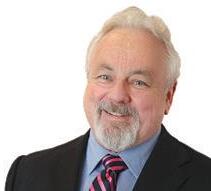
The new financial year has ushered in numerous positive changes for working people that should be celebrated as wins for the union movement.
Super guarantee
Let’s start with your super: after a decades-long campaign by the union movement, the superannuation guarantee increased to 12% from 1 July.
Super has always been union business, with the aim of ensuring working people can enjoy a dignified retirement. The IEU was a partner in setting up NGS Super in 1986.
Australia now has the fourth-largest retirement savings in the world at $4.1 trillion (currently behind the UK, Canada and the US) and it is projected to be second largest by the early 2030s.
The average proportion of GDP spent on pensions in OECD countries is 9.3%. Here in Australia, it is about 2.4% and falling.
Minimum wage rise
The Fair Work Commission (FWC) reviews the minimum wage and award agreements every year. Employer groups had been lobbying for a 2.5% increase, while the Australian Council of Trade Unions (ACTU) argued for a 4.5% increase.
The FWC awarded an increase of 3.5% from 1 July. With inflation at 2.4%, this represents a real wage increase for minimum-wage workers – who are among the nation’s lowest paid.
ACTU Secretary Sally McManus said: “It’s 1.1 per cent more than inflation, so it means that, finally, award wage workers in Australia –our lowest-paid workers – are getting ahead again.” Nationally, workers reliant on award wages are disproportionately women, so increasing this base rate goes some way to addressing the gender pay gap (see page 7).
Get a union-negotiated agreement
Figures from the Federal Department of Employment and Workplace Relations reveal that those on union-negotiated agreements are gaining increases of 3.8%, while those on non-union agreements receive 3.2%.
For those IEU members who are covered by modern awards, perhaps now is the time for your chapter to request a pay rise in line with those granted by the FWC.
Better yet, contact your organiser and discuss how employees at your workplace can seek to be covered by a union-negotiated agreement. Not only do such agreements have much higher enforceable wage rates, they also have superior conditions; for example, more sick leave, long service leave and parental leave.
Paid parental leave
Speaking of parental leave, from 1 July, the government paid parental leave scheme increased from 22 weeks to 24 weeks. (And it is legislated to increase to 26 weeks on 1 July 2026.)
This scheme provides for 24 weeks of paid leave at the minimum wage rate which, as noted above, increased by 3.5% on the same day the paid parental leave scheme was expanded. The weekly minimum wage is now $948 per week.
And, from 1 July this year, superannuation is also now paid on the government’s paid parental leave scheme. The IEU has negotiated for super to be paid on paid parental leave in our agreements. These measures help to reduce the gender retirement income gap.
Support staff pay rises
On the first full pay period after 1 July, support staff in Catholic systemic schools (excluding the Broken Bay diocese) will receive a well-deserved 3% increase to their pay, after gaining 4% last year and another 3% due from 1 July 2026.
Members will recall the IEU’s long fight for pay parity with support staff colleagues in government schools. We encourage you to remind potential members how these pay rises are won and invite them to join the IEU.
Other milestones
Teachers Health is an IEU partner and many of our members enjoy the benefits of an award-winning, not-for-profit, union-based health fund. It is the largest industry-based fund and the sixth largest health fund in Australia. On 1 July this year, Teachers Health merged with Queensland-based Teachers Union Health.
Commonwealth Practicum Payment (CPP): from 1 July, the federal government is offering eligible students access to $331.65 per week while they are undertaking a mandatory placement (in teaching, nursing, midwifery or social work).
Well-deserved wins
These wage, super and parental leave gains have been delivered by union members working together collectively over decades.
The fairer bargaining laws and stronger workplace rights introduced by the federal government since 2022 have given us a platform to capitalise on these wins.
Congratulations on your part in advancing workers’ pay, conditions and protections.
Remember, union membership is a legitimate workplace expense and your union fees are fully tax deductible. Don’t forget to claim them when doing your tax return.
If you don’t have a record of your fees, please contact our membership team on 8202 8900 (press 1) or email membership@ieu.asn.au and we can send them to you.

Over recent months, Brindabella Christian College has been at the centre of a financial and governance crisis that deeply affected its employees and operations.
Employees at the school in Canberra have faced immense pressures caused by poor administration of its finances and governance.
Brindabella has had significant cashflow distress and was millions of dollars in debt. Consequently, the school was unable to meet its obligations in relation to employee entitlements including periods where employees were not paid superannuation and wages.
This prompted the union to escalate multiple disputes to the Fair Work Commission (FWC).
Action was also taken against the school by the Australian Taxation Office over unpaid debts.
On 5 March 2025, Brindabella entered voluntary administration, with administrators appointed to ensure it could continue operating.
By April, the administrators named Christian Community Ministries (CCM), a Queensland-based organisation overseeing Christian schools nationwide, as the preferred new owner.
The transfer of ownership has since been finalised, with CCM pledging a commitment to Christian education, financial stability and sound governance.
What happens to employees’ entitlements?
Brindabella employees are covered by either the ACT Christian Schools Teaching Staff Multi-Enterprise Agreement 2020 or the ACT Christian Schools General Staff Multi-Enterprise Agreement 2021 (collectively referred to as the MEAs).
Under the ‘transfer of business’ rules in the Fair Work Act 2009 (Cth) (the Act), the MEAs continue to apply if: the employee’s employment with the previous employer was terminated the employee was re-employed by CCM within three months the nature of the work performed by the employee remains the same or substantially similar there is a connection between the old and new employer, such as through a transfer of assets.
By virtue of these rules, existing Brindabella employees will continue to receive the benefits of the MEAs.
However, new employees do not receive the benefit of the ‘transfer of business’ rules. Instead, they may be covered by the relevant modern awards, which offer inferior entitlements, or the enterprise agreement that applies to CCM.
Protecting union members’ entitlements
To safeguard members’ rights, the union has the option to apply to the FWC for an order that the MEAs continue to apply to all Brindabella employees, including new employees.
Alternatively, CCM may seek an order for its own enterprise agreement (which applies in all the other schools that they operate throughout Australia) to apply to the school.
To determine the best path forward, the union conducted a comparative analysis of both agreements and sought employees’ views through a survey.
On 1 July, Brindabella employees were given an opportunity to ask questions of CCM management through a Q&A session.
Our union reps attended to ask the right questions about protecting members’ interests.
That session was followed by a meeting between CCM and the union on 4 July.
After careful analysis and the meeting with CCM, the union considers it is possible that teacher members would be better off under CCM’s enterprise agreement, provided they receive the 4.5% location allowance under the EA and conditions are maintained.
Discussions about general staff will continue.
During the meeting, the union strongly advocated to protect beneficial employee entitlements.
The union is hopeful members at Brindabella may finally experience stability and certainty.
‘Whole school approach’
Recent research on bullying emphasises the importance of prevention – anti-bullying policies, classroom rules and discussions about bullying – and what experts call the “whole school approach”.
“Instead of bullying being seen as the responsibility of the principal or other senior teachers to deal with a few “at risk” kids, it is the responsibility of all staff, students and parents – and even the broader community,” Victoria University researchers Fiona McDonald and Nina van Dyke wrote in The Conversation
Special exemptions for faithbased schools to discriminate against staff and students must be reviewed to reflect community expectations and send a clear message that discrimination is wrong and damaging in all contexts.
“Research shows that LGBTIQA+ students experience far higher levels of bullying, have fewer sources of support and are at higher risk of self-harm,” the submission said.
Other issues raised by the submission include the impact of new anti-bullying procedures on workloads and the importance of safeguards against the bullying of teachers.
The ACTU’s Work Shouldn’t Hurt report highlights the dangers evident in education workplaces. The education industry recorded the highest percentage of workers with mental health injuries.
The submission said reducing bullying in schools and ensuring students have the support of teachers delivering anti-bullying programs requires “meaningful government and employer investment in the education workforce and promotion of the teaching profession”.
“Addressing teacher shortages, improving pay and reducing workloads and burnout are essential steps toward creating safer school environments, where staff are respected and supported,” the submission said.
Teacher consultation
The Anti-Bullying Rapid Review
co-chairs Dr Charlotte Keating and Dr Jo Robinson will hold roundtable discussions to hear from teachers about current procedures and best practice approaches that address bullying within schools.
They have asked the union to nominate 5-10 members to participate in the following sessions:
1 August – Canberra
5 August – Tamworth
6 August – Sydney
If you’re interested in joining one of these sessions, please email us: ieu@ieu.asn.au
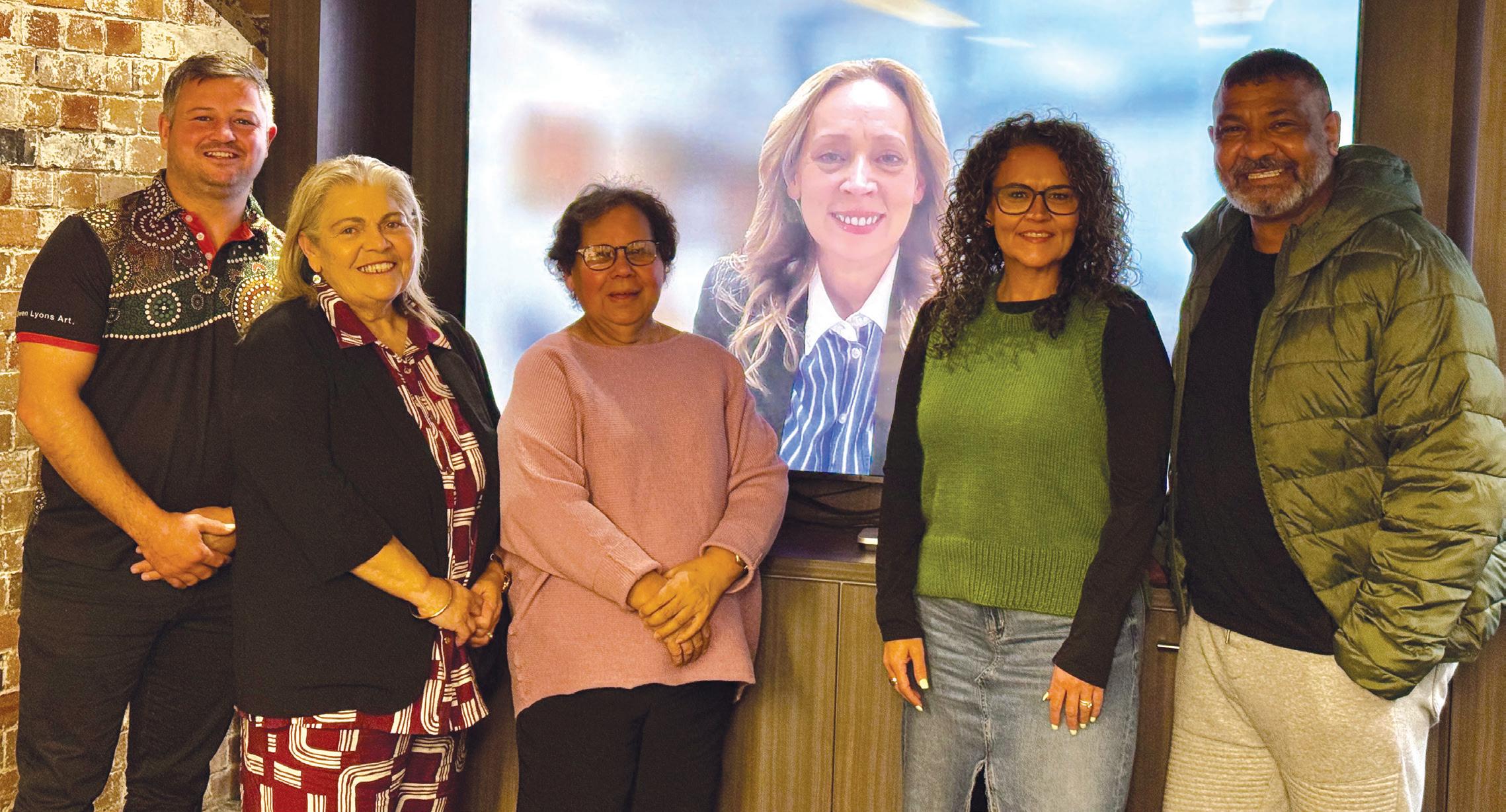
The IEU has a long tradition of standing in solidarity with Aboriginal and Torres Strait Islander communities.
The Aboriginal and Torres Strait Islander Advisory Committee provides practical advice to the Executive and elected officials so that these good intentions can be transformed into measurable outcomes.
This year, NAIDOC Week was held from 6-13 July and its theme, “The Next Generation: Strength, Vision & Legacy,” celebrated not only the achievements of the past but also the bright future ahead.
At their June meeting, we asked committee members what NAIDOC Week means to them:
Kylie Booth-Martinez
Vice President Support Staff
“NAIDOC Week is an important time for myself personally, for my students and for my community. We all come together as one to celebrate the world’s longest living culture.”
Michelle Thompson
Vice President Early Childhood Services
“We are currently reflecting on our program, at setting and investigating ways that we can embed an Aboriginal and Torres Strait Islander perspective each week.”
Craig Duncan
Education Officer, Catholic Schools Office, Diocese of Maitland-Newcastle
“It’s a great event that everyone should be able to attend and it celebrates Aboriginal and Torres Strait Islander people and the culture that has been here for over 65,000 years.”
Aboriginal Liaison/Learning Support Officer at All Saints Catholic College, Liverpool
“It’s something we need to celebrate with the rest of Australia, with our multicultural brothers and sisters and we also need them to open up and embrace our culture as much as we embrace theirs.”
Kye Longford
Aboriginal School and Community Support worker, St Joseph’s Primary School, Narrandera
“The kids are our future so the more we can educate them and help them learn and understand, the more they can communicate throughout their story or throughout their life.”
Aunty Mary Atkinson Aboriginal Community Engagement Coordinator for Catholic Education Diocese of Wagga Wagga
“We’re talking and learning and working together to be able to share our culture. We as Aboriginal people are sharing, caring people.
“What we have, we share with everyone. We just need people to sit, listen and journey and talk with us.”

A lack of respect shown by parents towards school staff has prompted the IEU to demand action from employers to stamp out bad behaviour.
Delegates unanimously endorsed a motion at the March Council meeting noting “the increase in unsafe behaviours from the parental community”.
In June, IEUA NSW/ACT Secretary Carol Matthews wrote to Catholic dioceses in NSW and the ACT outlining the union’s request for actions to ensure respect for teachers, including: formally acknowledging the concerning rise in abusive behaviours by parents towards staff reminding parents of their obligation under diocesan family and school partnership principles and policies, and • developing an addition to the assault register to enable staff to report unsafe parent behaviours effectively.
Some dioceses responded positively to the IEU’s letter, offering to work with the union to enhance respect for the profession. Other dioceses referred to existing procedures for dealing with disrespectful parental behaviour towards school staff.
Diocese of Wollongong Executive Director of Schools, Peter Hill, said respect for teachers and other school staff “is an area that we have in common and presents an opportunity to work together to promote and enhance the teaching profession”.
“Although this presentation of unsafe behaviour by parents is infrequent among schools in the Diocese of Wollongong, it is a shared concern,” he wrote.
Newsmonth, in June, reported that a rising tide of online abuse directed at teachers and principals had prompted calls for parents to be fined.
The chairman of Victoria’s Independent Office for School Dispute Resolution, Frank Handy, called for $1000 fines to deter parents from making inflammatory comments about school staff.
“Declining respect for the teaching profession has long been a factor in teachers’ dissatisfaction with their jobs,” Matthews said. “It has a major impact on their health and wellbeing.”
Attacks on teachers before and during the federal election campaign prompted education unions to demand the Coalition stop vilifying teachers.
Teachers and support staff have secured a big win after the NSW Parliament in June passed a new law strengthening work health and safety (WHS) rights.
The Industrial Relations and Other Legislation Amendment (Workplace Protections) Bill 2025 strengthens the industrial rights of IEU members in NSW in the following ways:
Unions can run WHS prosecutions and receive payment for a successful case
• Unions and employers can have unresolved disputes heard independently by the NSW Industrial Relations Commission
Unions can seek reviews of SafeWork NSW decisions
It is now mandatory for employers to comply with the WHS codes of practice – or a higher standard.
Industrial Relations Minister Sophie Cotsis told the NSW Parliament the new law “strengthens work health and safety laws by introducing further accountability, transparency and, most importantly, preventative measures to help keep workers safe”.
IEUA NSW/ACT Branch Secretary Carol Matthews said the new law is a direct result of unions campaigning and advocating for better work health and safety rights.
“These new rights and conditions represent a big increase in industrial rights in NSW,” she said.
“They mean greater capacity to address WHS issues in the workplace, and they give unions somewhere to go if an employer or SafeWork NSW fail to address persistent WHS issues.”
Unions NSW Secretary Mark Morey said the new law was a direct result of the union movement campaigning and advocating for the interests of both public and private sector workers in the state.
“The rights and conditions won are the most significant increase in industrial rights for workers in NSW in over 30 years,” he said.
NSW Treasurer Daniel Mookhey announced the state budget in June, which included much needed investments in out-of-home care, early childhood education and public schools.
The IEU welcomes the announcement of $1.2 billion to address the crisis in the child protection sector, including a shortage of foster carers that has resulted in children being placed in temporary accommodation in motels and caravan parks under the supervision of unaccredited workers.
The budget also included an extra $200 million to increase First Nations access, enrolment and attendance in early childhood education as well as $10 million towards expanding early childhood education and care.
IEUA NSW/ACT Branch Secretary Carol Matthews said a properly funded sector significantly reduces social injustices for children from First Nations backgrounds.
“Government investment in the first five years of a child’s life is crucial for shaping long-term health and academic outcomes,” she said. “It also reduces the need for costly intervention programs later in life.”
The Treasurer also announced $9 billion in funding for four new schools and 140 new classrooms.
The union supports an increase in the NSW government’s average funding per student to an estimated $17,022, up from $14,819 in 2023.
The IEU also supports a world-class education system accessible to all children in all communities.
Branch Delegates to Federal Council
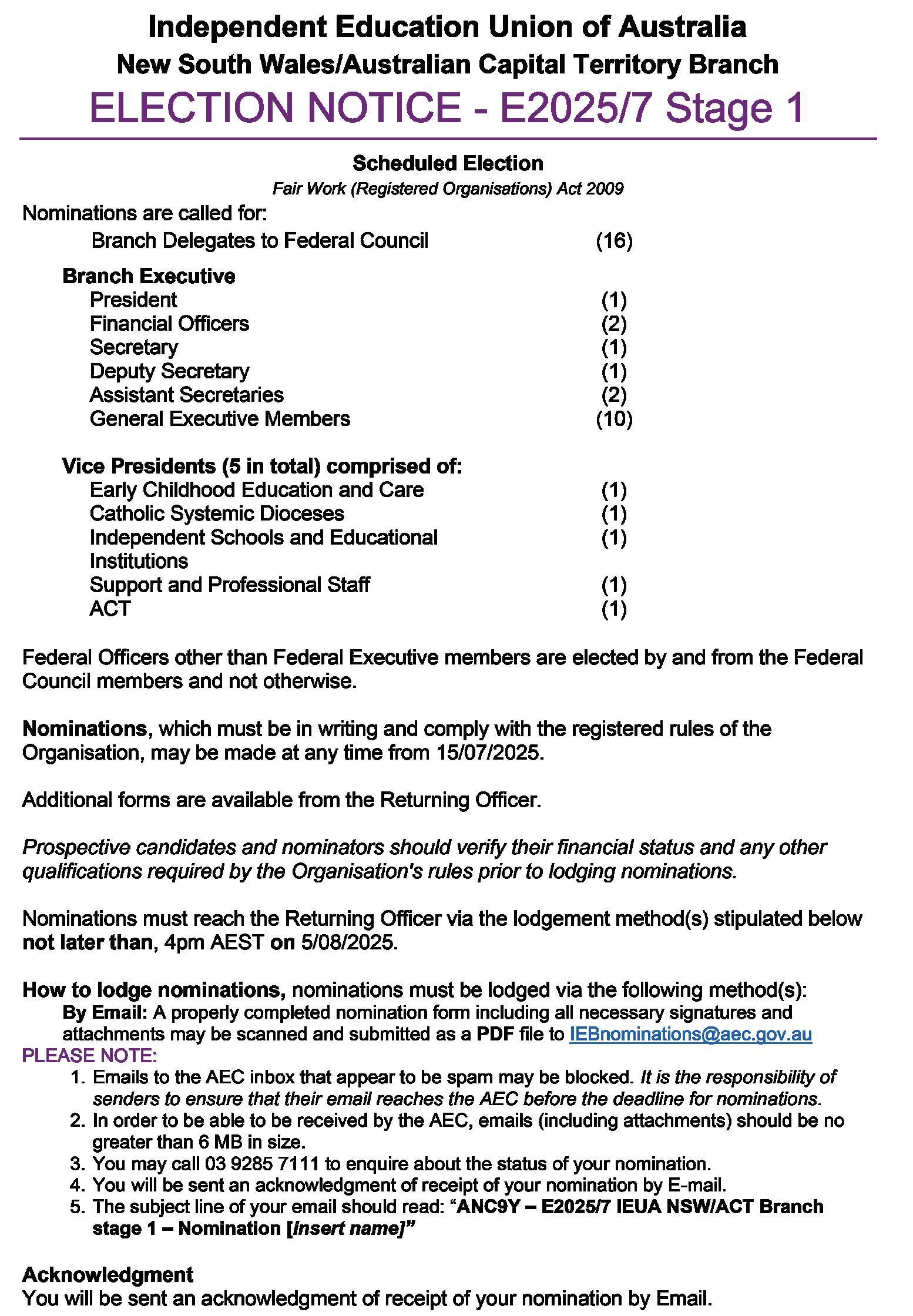

“I will fight it to my
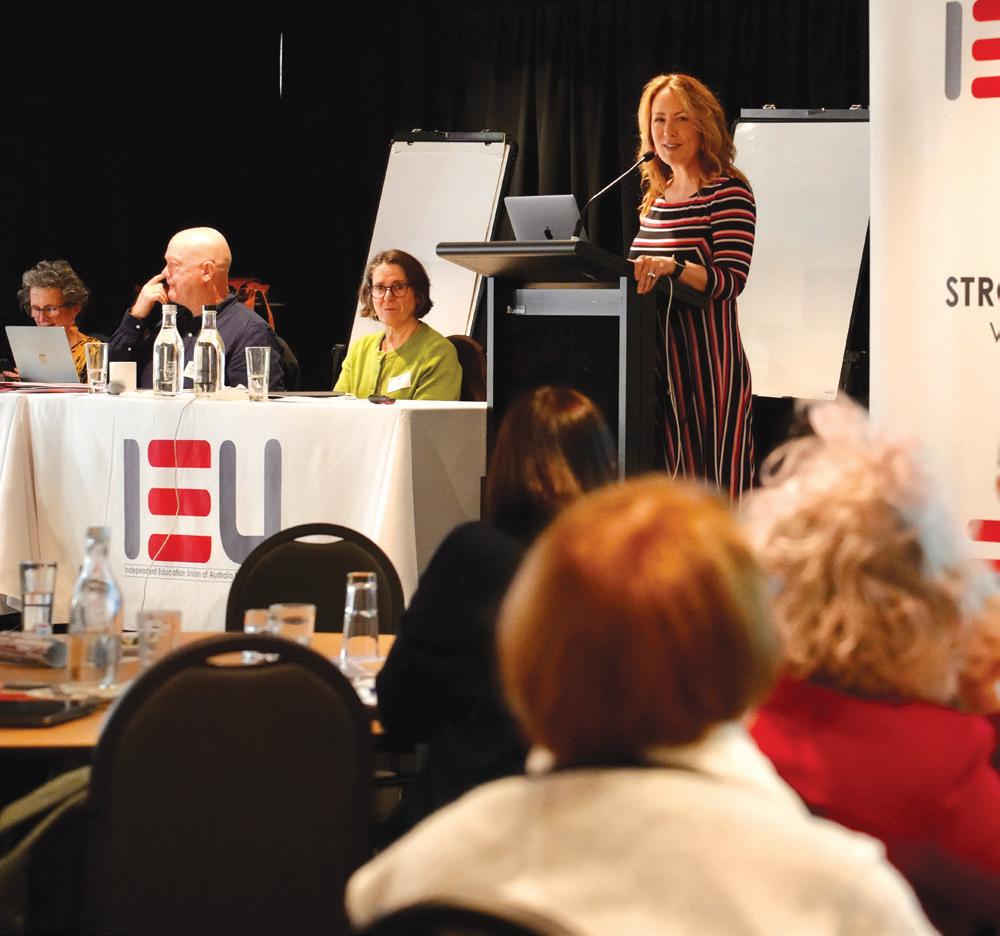
two of the most important issues IEU
face: proposed changes to workers compensation laws and the crisis in early childhood education and care.
Workers compensation in the crosshairs
The NSW government in June passed a Bill in the Lower House that would make it much harder for employees experiencing psychological injury to get the support they need.
Unions, including the IEU, campaigned strongly against these changes.
As a result, the Upper House referred the Bill to a parliamentary inquiry for greater scrutiny. Boyd, who is the Greens industrial relations spokesperson, is chairing this inquiry.
The workers compensation system is ripe for reform. But when the NSW government talks about “tightening up the rules”, Boyd said, what they mean is “cutting people out of the system who otherwise would be receiving support for an injury at work”.
“This is the most important Bill I’ve ever been involved in – I’ve never had something in front of me that could have such an immediate impact on people,” she said.
“I will fight it to my last breath.”
Boyd said the Bill singles out psychological injury and this runs counter to reducing stigma around mental health issues.
“Instead of people turning to alcohol, staying at home, or taking it out on family and friends and continuing to work, we’ve been encouraging people to take a step back,” Boyd said.
“If you’re injured at work, if you’ve got trauma, if you’ve been bullied, if you’ve been overworked, if you’ve seen dead bodies, whatever it happens to be – if in the course of your work, you have suffered a psychological injury, the workers compensation system is there to allow you to take that time out from work that you need in order to get better.”
Boyd drew attention to the complex “whole person impairment” threshold, established by psychologists, that an injured worker needs to meet to continue receiving support.
Under the proposed changes, this would more than double from the current 15 per cent to 31 per cent, and the timeframe for receiving support would be halved from five years to two-and-a-half years.
“I can’t fathom how they thought that would be acceptable,” Boyd said. “We talk about ‘savings’, but we’re talking about people’s lives.”
Boyd welcomed working with unions to delay the Bill but, she said, “we still need to make a fuss”.
Exposing abuses in early childhood education
Another hat Boyd wears is chairwoman of the Upper House’s Education Committee.
Boyd worked closely with ABC reporter Adele Ferguson on “Betrayal of trust”, a Four Corners episode that aired in March. The episode uncovered shocking abuse, neglect and regulatory failings in the early childhood education and care sector.
Many teachers and educators had spoken up since, Boyd said.
“They’re saying, ‘Thank you for bringing this out into the open, because we know these things are happening, we’ve seen the corners being cut, the profit takers coming in’.
“‘We’ve seen the impact it’s had on our sector, and we would like to restore it back to the sector that it should be with children’.”
The combination of insufficient training, low wages, lax regulators and the profit motive is at the heart of the problem.
“A private equity firm is designed solely to buy a business, cut as many costs as possible, maximise its profit, then sell it on,” Boyd said.
The result is exploitation of children, parents, teachers and educators.
The inquiry begins hearings in August, and the IEU has already made a submission (see page 9).
“We’ll be trying to unpick exactly what’s been going on, bring it all out into the sunshine and give it a bit of disinfectant,” Boyd said.
“Then we’ll be looking to build on that, and to work out where we go from here, to restore the sector to what it needs to be.”
Questions have been raised about the federal government’s social media ban for teenagers after age-checking technology wrongly guessed some students as 37-year-olds.
Students at Canberra’s St John Paul II College, who used the age-verification technology as part of the federal government’s trial, were misidentified by up to two decades.
The social media ban for under-16s is due to take effect in December after the Albanese government passed legislation in 2024 with the support of the Coalition.
The government claims the ban will help combat the youth mental health crisis as well as assist parents to resist the “pester power” of children who want to use platforms such as TikTok, Instagram, Snapchat and X.
Age-checking doubts
Preliminary findings from the government’s technology trial were released in June, with operators insisting age checking can work without infringing privacy.
“The preliminary findings indicate that there are no significant technological barriers preventing the deployment of effective age-assurance systems,” project director Tony Allen said.
However, the ABC reported school children in the government’s technology trial were identified by some programs as being aged in their 20s and 30s.
Face-scanning technology could only guess ages within an 18-month range in 85 per cent of cases.
RMIT University information sciences professor Lisa Given said she did not think the ban was viable based on the technology trial.
“The accuracy level at 85 is actually quite low, and an 18-month range is significant when you’re trying to identify a very particular age grouping,” she told the ABC.
Social media delay
The Guardian, meanwhile, reported the trial had found “concerning evidence” some technology providers were seeking to gather too much personal information.
The trial is being run by the Age Check Certification Scheme and testing partner KJR. Its report to the government on the trial’s progress has been delayed until the end of July.
Concerns over the accuracy of age-verification technology come as eSafety Commissioner Dr Julie Inman Grant urged the Albanese government to add YouTube to its under-16s social media ban.
The Sydney Morning Herald reported that research by the eSafety Commissioner shows four-in-10 young teenagers have been exposed to harmful content, such as eating disorder videos, on the platform.
Dr Inman Grant also conceded children would find ways around the ban, such as using VPNs.
“We are not building a great Australian internet firewall, but we are seeking to protect under-16s from those unseen yet powerful forces in the form of harmful and deceptive design features that currently drive their engagement online,” she told the ABC.
“For that reason, it may be more accurate to frame this as a social media delay.”
Other technology
Other age-checking methods include analysing biological traits such as voice and hand movements to estimate a user’s age.
However, the ABC reported this software presents similar accuracy issues, while guessing a person’s age based on their online activity is also imprecise.
A government-issued ID, such as a passport or driver’s licence, is the strongest proof of age, but the legislation implementing the social media ban prevents social media companies from asking for it.
Instead, platforms are required to offer users alternative methods to prove their age.
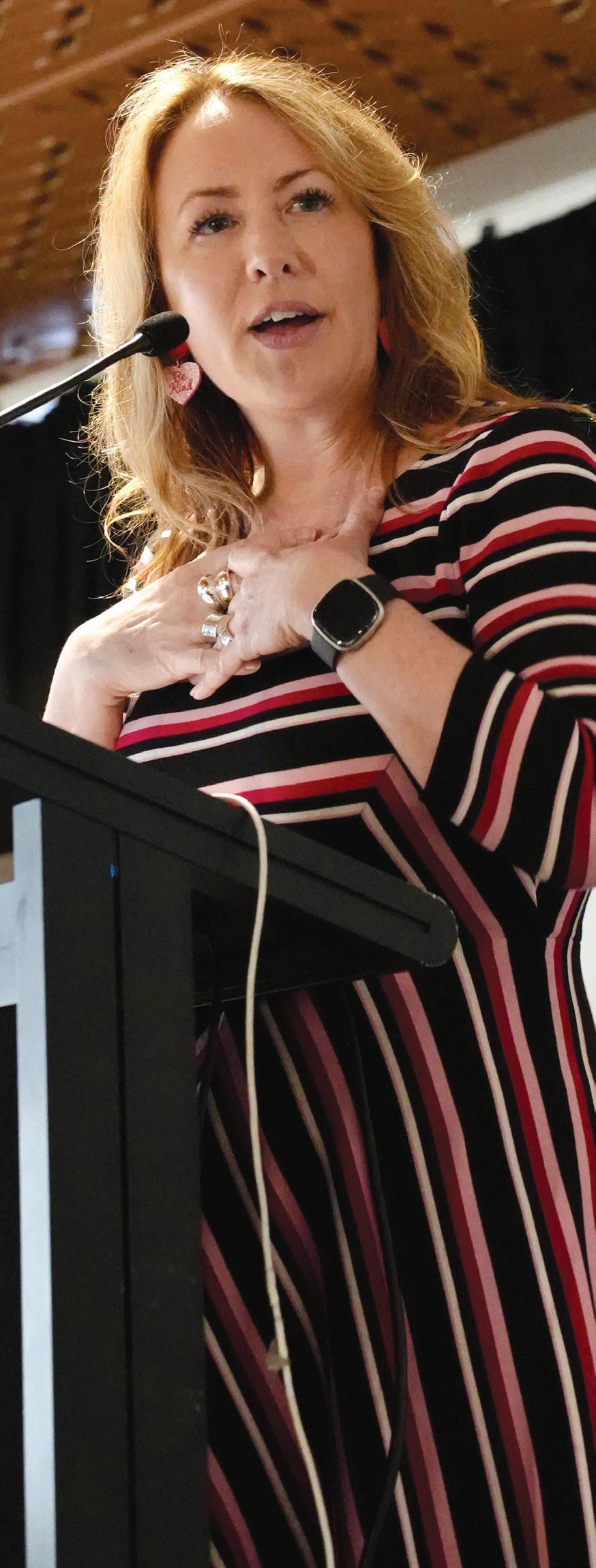
Gaming addiction and smartphone overuse on the rise
Australian students are staring at screens for up to nine hours a day, according to new research that found 10 per cent of students were at risk of smartphone addiction.
The Macquarie University study also shows children as young as 10 displaying signs of clinical-level Internet Gaming Disorder, which may lead to social and emotional problems.
Lead researcher Brad Marshall, from Macquarie University’s School of Psychological Sciences, said the study showed gaming addiction and smartphone overuse were starting in primary school rather than the teenage years.
Screen use disorders in primary schoolers
Marshall said the findings suggested about 100,000 Australian children had gaming disorder and 350,000 were at risk of smartphone addiction.
“Gaming addiction and smartphone addiction start in primary school,” Marshall told The Sydney Morning Herald. “This is not a year 10 to 12 phenomena.”
More than 2000 students from six independent schools were surveyed about their screen use during 2023.
High school students averaged nine hours daily on screens, while primary students spent 6.34 hours. A 2017 study put daily usage at just over four hours for primary students and six hours for high school students.
Girls showed higher rates of smartphone addiction, while gaming disorder was more common in boys.
Another study found higher screen use in children may exacerbate aggression, anxiety, attention difficulties and depression, suggesting video gaming has the strongest link for developing social and emotional problems.
Marshall, who also runs a Screens and Gaming Disorder Clinic, said he was surprised by the high screen time revealed by the study.
“And that’s even though I work with children at the pointy end in my clinic,” he told The Lighthouse. “I see kids literally being arrested at age 12 for beating their parents because they try to take their mobile phone, or kids that have not been to school for two or three years.”
However, Marshall said gaming and smartphone use affected children differently.
Children with clinical-level gaming disorder showed developmental impacts four times higher than those without screen problems, particularly on social/physical activity and emotional development.
Screen-use disorders may have other impacts such as preventing children from completing homework or going to school, in addition to behavioural problems and student distraction that will fall on teachers to manage.
School-based early intervention and prevention programs may add to the crushing workload teachers already face.

Union members are shocked and distressed by revelations of abuse and mistreatment of young children in the early childhood education and care sector.
The criminal allegations emerging from Victoria in early July are deeply disturbing and require strong action.
“Earlier in the year, the abuse and mistreatment of children uncovered by Four Corners, prompting a NSW Upper House inquiry, were also shocking and robust reform is essential,” said IEUA NSW/ACT Branch Secretary Carol Matthews.
“For more than 50 years, union members have pushed for better pay, conditions and training to ensure higher standards of early childhood education and a strong culture of child safety.”
The union is actively engaged with the National Child Safety Review as well as the NSW Upper House inquiry into the early childhood education and care sector.
The IEU has also consulted with the NSW Regulatory Authority for early childhood education and care.
Careful solutions – not quick fixes
“While child safety must be paramount, now is not the time to rush out quick solutions that fail to address the complex underlying issues in this sector,” Matthews said.
Specialist training in child protection should be mandatory for all staff, volunteers, nominated supervisors and authorised providers.
Current laws require just one member of staff who has undertaken training to be on the premises at all times.
“CCTV is not a magic bullet – for example, it cannot be installed in baby-change rooms and bathrooms. It is no substitute for a strong child safety culture,” Matthews said.
All employees should be required to hold a valid Working with Children Check (not just to have applied for one).
“But this system is not failsafe, in that it only picks up criminal records or serious reportable conduct allegations,” Matthews said.
“Better information sharing protocols are needed to close gaps.”
“While child safety must be paramount, now is not the time to rush out quick solutions.”
The union has long raised the alarm about chronic staff shortages in the sector caused by poor pay and conditions.
The IEU calls for action to:
address the acute staffing shortage by raising wages and providing professional development leading to better recruitment and retention

Australia has recorded its best ranking in a global survey of gender equality in almost 20 years.
Australia rose 11 places to 13th out of 148 countries in the World Economic Forum’s latest gender gap report – a significant improvement since 2021 when Australia ranked 50th.
The Global Gender Gap Report ranks countries using four key benchmarks: economic participation and opportunity; educational attainment; health and survival; and political empowerment.
Iceland retained its top ranking for the 16th consecutive year, followed by Finland, Norway, United Kingdom and New Zealand. The United States ranked 42nd in terms of gender equality.
Federal Minister for Women Katy Gallagher welcomed the result – Australia’s third successive rise in the rankings.
“Whether it is investing in women’s wages and economic opportunities, investing in sexual and reproductive healthcare, or investing in policies to address women’s safety and tackling gender-based violence, our government is backing up words with action,” she said.
Unions have played a pivotal role in fighting for gender equality.
The narrowing of the gender pay gap is in no small part thanks to new union-won workplace rights and the federal Labor government’s wage reforms.
Superannuation now paid on government-funded parental leave will also help address equality and dignity in retirement for working women.
The right to disconnect from work outside normal working hours followed union campaigns and federal Labor’s Closing the Loopholes legislation. This is an important win for women striving for a healthier work-life balance.
The IEU continues to fight for equity for women in salaries and conditions.
IEUA NSW/ACT Branch Secretary Carol Matthews said better pay and conditions in feminised sectors such as education are directly linked to more women joining unions over the past decade.
“We know there is much more to be done to advance gender equity and deliver fairer and safer workplaces for all women,” she said. “The IEU will continue to fight for better salaries and conditions for all our members.”
pay teachers in the early childhood sector the same as their counterparts in schools
prevent teachers and educators being alone with children at any time during the day
improve staffing ratios to ensure proper levels of supervision
• create safer systems for staff to report concerns quickly without fear of repercussions
lift the quality of training by getting rid of shonky training organisations issuing substandard qualifications boost federal government funding for not-for-profit (NFP) and community-based services.
Profit model flawed
Research shows that centres run by NFP providers consistently achieve a higher rating under the National Quality Standards than for-profit services.
NFPs invest more in wages and conditions leading to a stable, qualified and committed workforce, which is crucial to safety.
“The business model of for-profit providers needs reform – the focus on profits rather than high-quality education and care is a big reason behind safety breaches,” Matthews said.
“Regardless of the business model, all staff should receive ongoing, specialised professional development in both child safety and caring for children who have high learning support and/ or behavioural needs.”
The union has achieved a big win for members in early childhood education after reaching a deal with the South Eastern Sydney Local Health District over unpaid meal breaks.
Four members who worked at the Lorikeet Early Learning Centre at St George Hospital in Kogarah are owed $63,381 for unpaid meal breaks.
The union will achieve pay justice for these members despite encountering hostility from the Human Resources department, which tried unsuccessfully to demand proof that the members had not agreed to unpaid breaks.
HR then tried to argue that signing in and out of the premises each day (as required to be paid) was some kind of agreement to an unpaid break.
Requiring an employee to prove they did not agree to an unpaid break and/or to count the sign in-out book as an agreement to an unpaid break contravenes award provisions.
The award clearly states that any agreement to an unpaid meal break must be in writing and kept with pay records.
The union is still fighting for backpay for a union member who retired in 2021. The employer claims this issue was never raised with them despite documentary evidence to the contrary provided by the union.
The union thanks members for their solidarity and commitment to justice in the face of their employer’s hostility. The union stands by members fighting for their just entitlements.
We are stronger together.
The IEU calls for increased funding for children with additional needs and challenging behaviours, as a national census finds more students are starting school with poor social skills and low emotional regulation.
Data from the 2024 Australian Early Development Census (AEDC) shows an increase in the number of children who are developmentally vulnerable since 2021.
More children vulnerable
The AEDC surveyed more than 288,400 children in the first year of full-time schooling, measuring their development in physical health, social competence, emotional maturity, language/cognitive skills and communication skills/general knowledge.
The census, which has been conducted every three years since 2009, showed a decline in each of these five areas.
The census found just over half of children are developmentally on track in each category – a decline of 1.9 percentage points since 2021.
The greatest declines were in emotional maturity (1.5 percentage points) and social competence (1.1 percentage points).
Emotional maturity includes pro-social and helpful behaviours, and the absence of anxiety, aggression, hyperactivity and inattention. Social competence is a measure of children’s responsibility and respect, approach to learning and readiness to explore new things.
More staff and resources crucial
The census results reflect the experience of IEU members in early childhood education who report up to 60 per cent of children at their service have learning support needs.
IEUA NSW/ACT Branch Secretary Carol Matthews said funding has not kept pace with the number of children with additional needs or who present challenging and extreme behaviours.
“Teachers are constantly calling for additional staff to support children with extra needs,” Matthews said.
Students with challenging behaviours can also constitute a major workload stress.
“There is a struggle to find a balance between the rights of a child with behaviour issues and the rights of other students and staff,” Matthews said.
“These matters take place within the context of the employer’s obligation to provide a safe place of work.”
Early childhood education is crucial
Federal Education Minister Jason Clare told The Australian in June that the data showed “the impact of the pandemic on our kids”, including lockdowns leading to social isolation.
Clare said the census showed the importance of the government’s commitment to provide all children with access to three days a week of subsidised early education and care.
“This data also shows the importance of early education to prepare children for school,” he said. “It shows children who attended preschool were 1.5 times more likely to be developmentally on track.”
Steps towards universal early education
The IEU welcomes the Albanese government’s progress towards universal childcare, including building more early childhood education and care centres and supporting highquality not-for-profit providers.
“Research shows the importance of early childhood education for developing children’s cognitive, social, emotional and physical skills to transition well into school,” Matthews said.
“Government investment in the formative first five years is crucial for shaping long-term health and academic outcomes and reduces the need for costly intervention programs later in life.”
A properly funded early childhood education and care sector also significantly reduces intergenerational social injustices for children from First Nations, remote and lower socio-economic and educational attainment backgrounds.
Better pay leads to high-quality services Matthews said high-quality services employ teachers and staff who are adequately paid, trained and resourced to deliver the best possible learning experiences.
“Investment in both teacher development and adequate pay and conditions will translate to better service quality that ensures all children reach their full potential,” she said.
The IEU strongly supports the federal government’s effort to address the staffing crisis in the long day care sector with 15 per cent pay rises for teachers and educators.
The union is also pursuing pay rises for teachers in NSW community preschools, where there is a similar staffing crisis. “These teachers have the same qualifications as their colleagues in schools but are paid substantially less,” Matthews said. “We are fighting to change that.”

The IEU welcomes the federal government’s National Child Safety Review to boost child safety in early childhood education and care (ECEC).
The union is shocked and appalled by cases of mistreatment and abuse of young children at some centres that have been revealed in the media over the past few months.
National model of information sharing
Effective information sharing can help prevent individuals known to pose a risk from gaining access to children in early education settings.
However, the IEU in its submission to the review calls for clear safeguards to ensure that any sharing of staff information is limited to appropriate parties and used solely for child protection and legitimate purposes.
To eliminate both serious and low-level unacceptable behaviours, staff must have access to stronger structural supports, including professional development that addresses child safety and the thresholds for reportable conduct.
Clear guidance needed
The IEU calls for the following measures to be implemented, either before or alongside information-sharing provisions:
• clear definitions and guidance on inappropriate conduct, thresholds and reporting lines
• child safety training programs for all staff directly interacting with children, as well as short and accessible training programs tailored for Approved Providers and Management Committees
• strong protections to ensure procedural fairness and confidentiality in cases involving prohibitions, suspensions or enforceable undertakings.
Staff wellbeing
In preparation for regulatory change, mandatory reporting obligations, misconduct thresholds and professional development in the sector must be improved to the same standard as schools.
Staff training should be on paid time to ensure equitable access for all ECEC employees.
To ensure staff wellbeing, the IEU recommends: stronger legal obligations on employers to uphold child safety adequate resourcing and working conditions
consistent use of workload assessment tools tailored to early childhood education updated policies and strategies to deal with evolving technology-facilitated abuse genuine employee consultation through participatory planning and decision making.
New child safety measures
The Albanese government’s child safety review comes as state and federal Education Ministers agree to stronger, mandatory child safety measures including: mandatory 24-hour reporting of any allegations, complaints or incidents of physical or sexual abuse – down from the current seven-day window a ban on vapes in all early childhood education and care services stronger protections around the use of digital technology, with services required to have clear policies on taking photos and videos of children, parental consent, CCTV practice and using service-issued devices.
These measures follow a decision last year to ban the use of personal mobile phones in centres.
Child safety will also be explicitly embedded into the National Quality Standard from 1 January 2026.
These changes are in addition to reforms flagged by the Albanese government in March to crack down on rogue operators and include measures to: prevent providers who persistently fail to meet minimum standards and repetitively breach the National Law from opening new Child Care Subsidy approved services take compliance action against existing providers with egregious and continued breaches, including the option to cut off access to Child Care Subsidy funding strengthen powers to deal with providers that pose an integrity risk.
Federal Education Minister Jason Clare said Australia has a very good system of early childhood education and care, “but more can be done to make sure safety guidance and measures are fit for purpose”.
Pay rise for teachers in long day care, page 13
Are you interested in becoming more active in the IEU? The IEU is calling for nominations for our ECEC State Council from early childhood teacher members.
The ECEC Council provides advice and guidance to the IEU Executive and the broader IEU Council (see page 12) on submissions and policies relevant to members employed in early childhood education and care centres. Councillors assist the union to develop and inform our position on a range of industrial and professional issues.
The union regularly makes submissions to the federal government, including the Productivity Commission and National Child Safety Review, as well as state and territory governments, including the current Inquiry into the Early Childhood Education and Care Sector in NSW. The union provides responses to sector consultations, including consultations on Regulatory Impact Statements.
ECEC Council meets four times a year, usually on a Friday. Meetings are held online and/or face-to-face in our Sydney office.
The IEU reimburses employers for the cost of employing a relief teacher to enable ECEC Councillors to attend meetings. The union also covers travel and accommodation for councillors from regional and remote areas.
In accordance with the rules of the IEU, ECEC Council is made up of eight members plus the Vice President Early Childhood Services, who is also a member of the IEU Executive.
ECEC members elect councillors from the following areas:
A total of three members elected by and from the sub branches of: Metropolitan East Ku-ring-gai
Lansdowne
Central Metropolitan
Northern Suburbs
Northern Beaches
Penrith-Blue Mountains
Southern Suburbs
Cumberland
One member is elected by and from the South Coast Sub Branch
One member is elected by and from the Hunter Valley Sub Branch and Central Coast Sub Branch
A total of three members elected by and from the sub branches of:
Central West
South East
Mid-North Coast
North Coast
Riverina
North West
If you are interested in standing for the ECEC Council, please call Joanna Kotsakis on 8202 8900 and request a nomination form.
Nominations open on Monday 21 July and close on Friday 15 August. Elections, if required, will be held in Term 4 2025.
For more information on how the IEU works, see page 12.
The IEU calls for early childhood teachers and educators to have comparable pay and conditions to their colleagues in schools to help solve the crisis in the early childhood education and care sector.
The IEU, which represents university-trained teachers in the sector, also wants a reduction in paperwork to ease the workload burden that is exacerbating the staffing crisis.
In a submission to the NSW Upper House inquiry into the early childhood education and care sector, the IEU called for a greater emphasis on developmental and educational outcomes and less focus on data collection and “documenting everything that happens throughout the day”.
Better pay and conditions and reducing paperwork are among the 25 recommendations in the union’s submission to the inquiry.
Other recommendations include reform of the accreditation system to reduce the stress and burnout the current process causes that, in turn, is contributing to staff abandoning the sector.
The inquiry, to be chaired by Greens MP Abigail Boyd (see page 6), was prompted by shocking revelations of mistreatment and abuse of young children in centres run by for-profit operators.
The IEU also wants measures to improve the safety and wellbeing of children. Employers should be held to account if they fail to provide a safe workplace or underpay employees.
Pay parity with primary schools
The IEU’s submission argues that better pay and conditions are key to improving the quality of early childhood education and solving the sector’s staffing crisis.
Early childhood teachers and educators should have pay parity with their colleagues in schools.
“Substantial improvements in wages and conditions are required to provide the highly feminised and ethnically diverse workforce with a standard of living adequate for their health, wellbeing and security,” the submission said.
Teachers and educators in some for-profit centres are expected to perform duties outside their professional responsibilities such as cleaning toilets, mopping floors and cleaning windows, the submission said.

Inadequate support for children with additional needs
The impact of inadequate support for children with additional needs is also noted.
Union members report up to 60 per cent of children in their centres have learning support needs, which require extensive documentation and often specialised training.
Funding has also not kept up with the cost of providing education and care for children with diagnosed learning needs, undiagnosed needs, and challenging or extreme behaviours.
This creates a potential risk to the health and safety of the individual child, other children and staff who struggle to care for children without adequate support.
Profits undermine safety and quality
Research consistently shows centres run by for-profit providers are of lower quality.
The submission highlights the damaging impact of high staff turnover and staff shortages, including members being unable to take lunch breaks or adequate programming time or being forced to work additional hours.
It also outlines how the profit motive undermines child safety and service quality, with members reporting: managers and owners assaulting employees qualified teachers being replaced with less-qualified staff requests for maintenance being ignored, which endangers children a lack of support for staff injured by children • they are discouraged from reporting incidents.
The submission notes that teachers working in for-profit centres report being underpaid or not receiving superannuation payments. It also said employment contracts issued by forprofit operators regularly breach minimum award standards.
in paperwork
Teachers and educators are leaving the sector in increasing numbers due to burnout and dissatisfaction, particularly the excessive workload caused by the volume of documentation that must be completed.
“Teachers constantly report that the amount of paperwork they are required to complete takes them away from being able to interact with the children,” the submission noted.
The union said the regulatory framework applied in NSW is complex, cumbersome and robs teachers and educators of opportunities for interacting with children.
Regulatory failings
The submission is critical of the NSW ECEC Regulatory Authority, which it said fails to provide advice on the national regulations and sends out ill-prepared officers who do not have adequate professional skills and knowledge to conduct assessments and ratings visits.
Draft reports based on these visits are poorly written, confusing and contain errors, lack detail and fail to assist centres to identify ways to improve their service.
Instead, the accreditation process ignores the wellbeing of staff and is leading them to consider finding work in other fields.
“Directors report that teachers and educators have lost faith in the A&R [assessment and ratings] process and their confidence and sense of purpose have been eroded due to inconsistency and subjectivity of accreditation decisions,” the submission said.
Rethink funding model
The submission calls on state and federal governments to rationalise funding for the sector and stop propping up forprofit providers.
“It is incomprehensible that taxpayers fund for-profit long day care services in the same way that not-for-profit long day care services are funded,” the submission said.
“It seems to be a reasonable expectation that a company making millions of dollars in profits can afford to pay its employees more than the award rate of pay.”
Pay rise for teachers in long day care, page 13
Michelle Thompson
Vice President Early Childhood Services

Our preschool ambassadors have been busy appearing at the Fair Work Commission as part of the union’s campaign for pay rises for teachers in community preschools.
The sector is experiencing its greatest ever challenge attracting staff as they compete with schools, which offer significantly higher wages. We are lucky to have such passionate members committed to the cause for the benefit of all teachers while simultaneously working in their own preschools.
Child safety
Alarming details in the media about the abuse and mistreatment of young children in some centres prompted the NSW government to commission an independent review of child safety.
The review, headed by former NSW Deputy Ombudsman Chris Wheeler, made a series of recommendations in response to a rise in safety breaches in the sector.
The union cautiously welcomes some of these reforms, but its submission to the NSW Upper House inquiry into the early childhood sector outlines further reforms that are needed to fix the crisis in the sector (see above).
Every child has a right to be safe, especially in early education and care settings. But staff wellbeing and right to procedural fairness should not be sacrificed.
New resources
The Australian Children’s Education and Care Quality Authority (ACECQA) has released new resources to help providers and services prepare for changes to the Education and Care Services national regulations that take effect on 1 September.
The NQF Child Safe Culture Guide is designed to help build child-safe cultures, and the NQF Online Safety Guide provides support to keep
children safe when using online and digital technologies.
Changes to the national regulations include: new requirements for the safe use of digital technologies and online environments
24-hour notification for abuse incidents and allegations (down from seven days) prohibiting the use of vaping substances and devices in services.
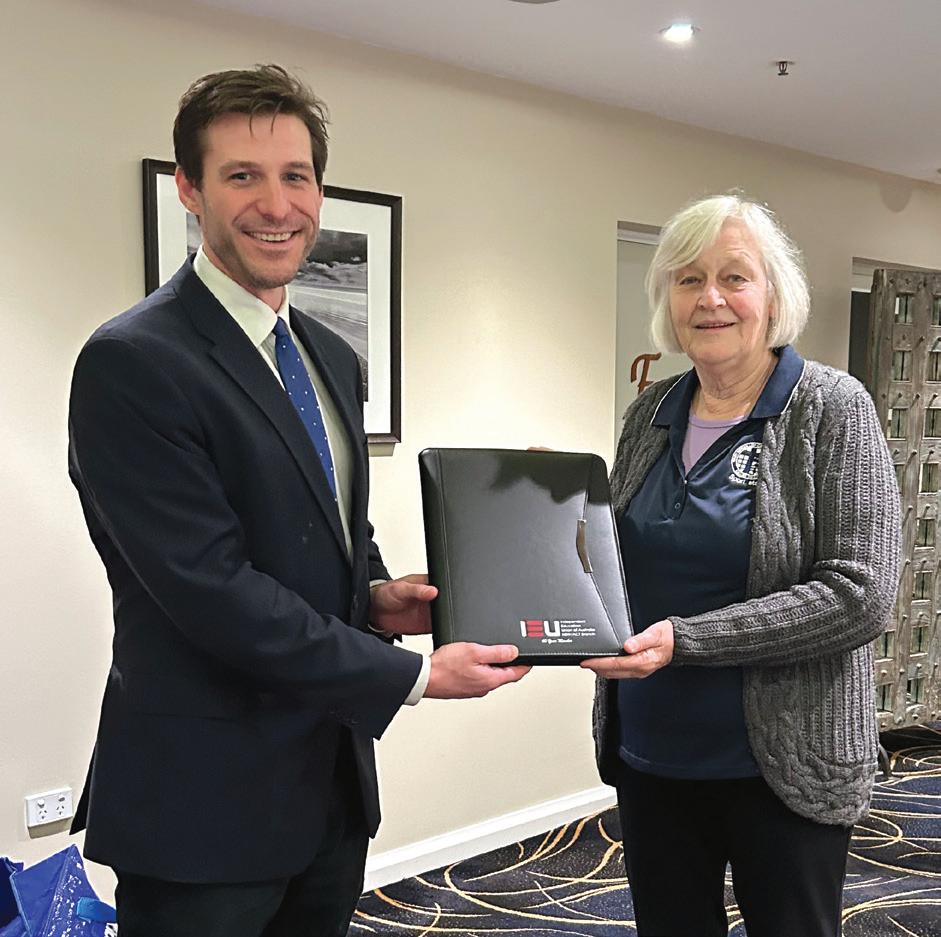
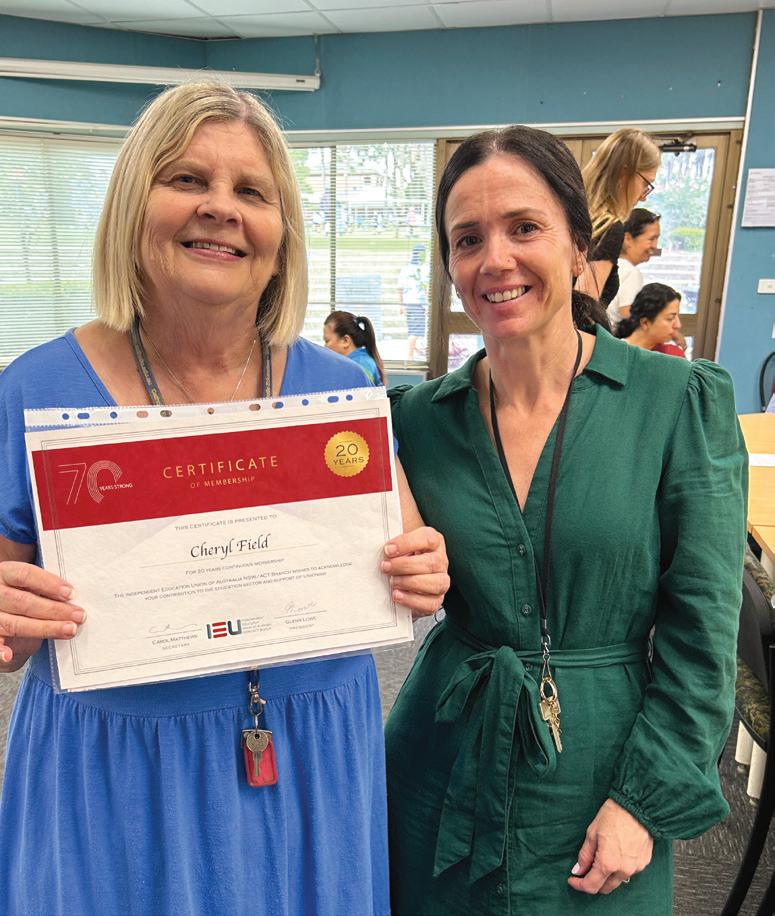

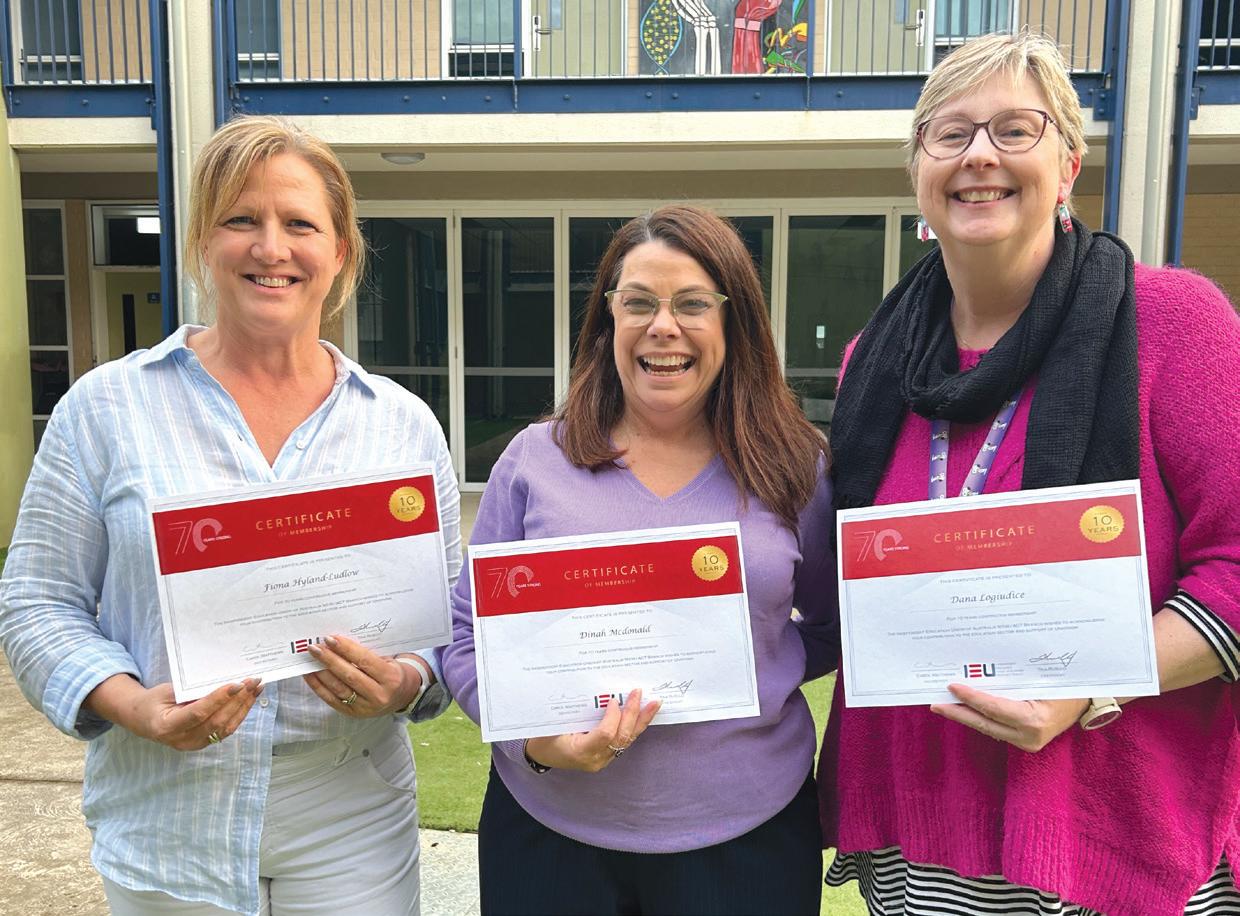
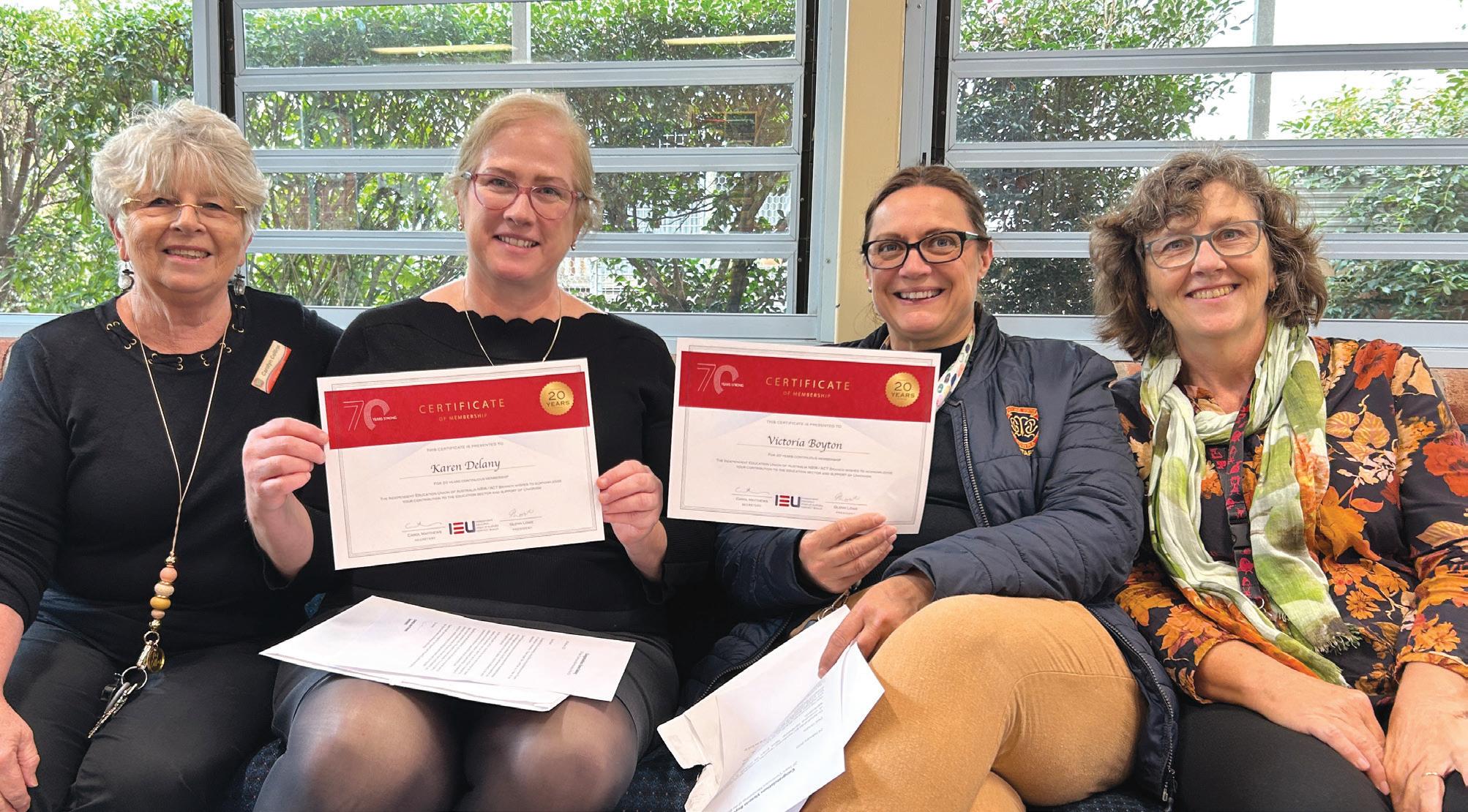
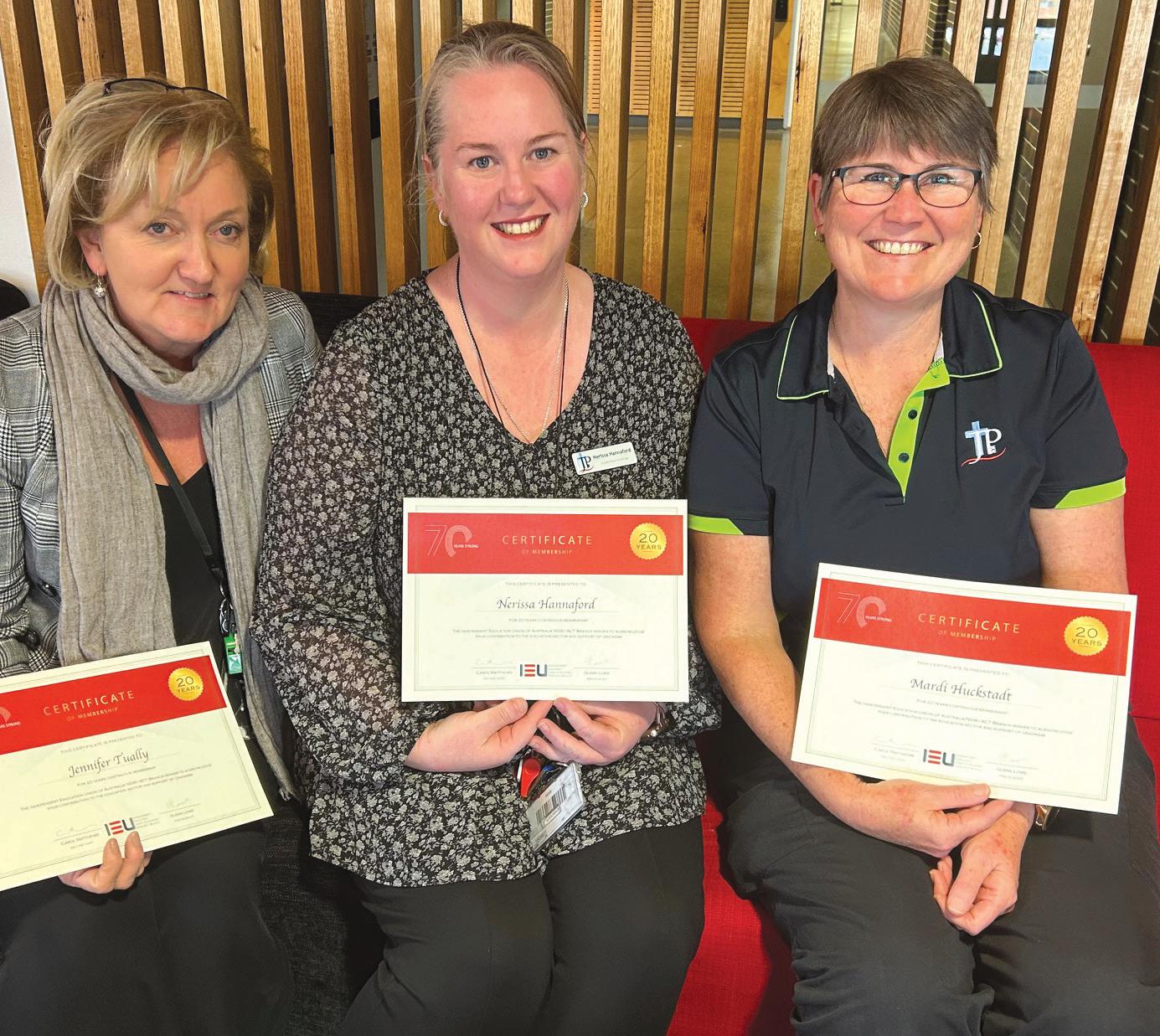

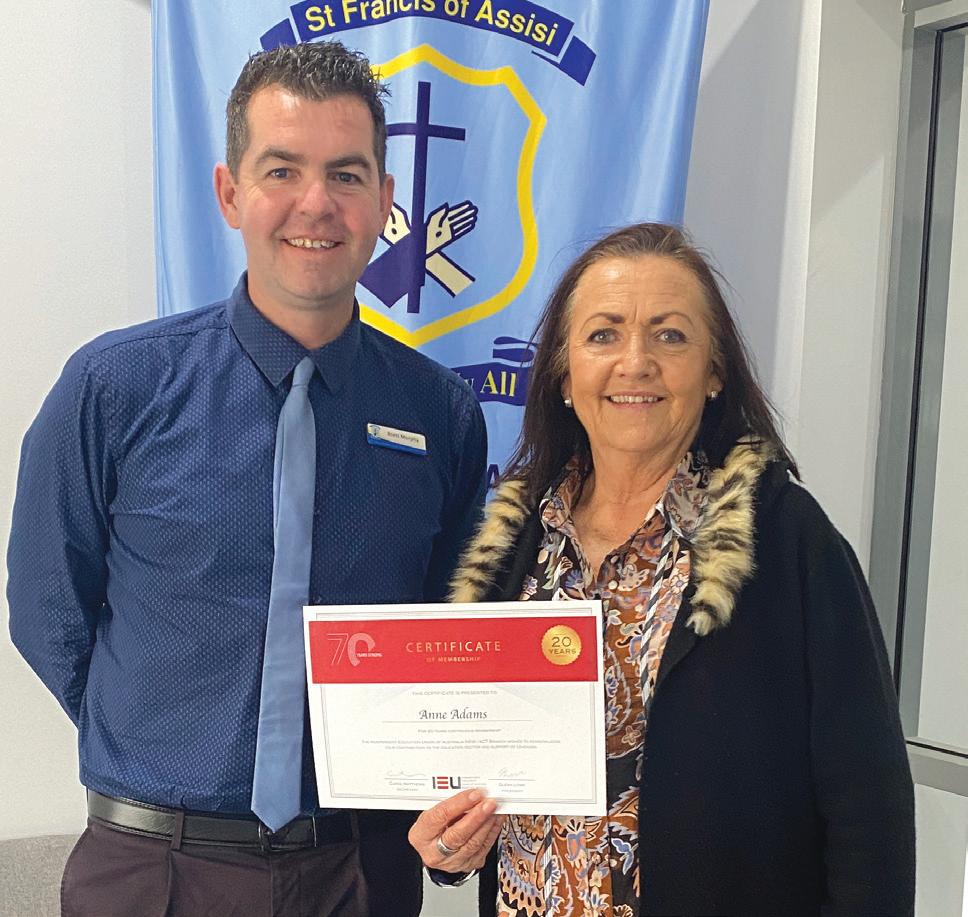
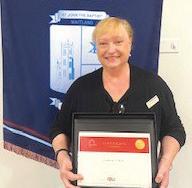
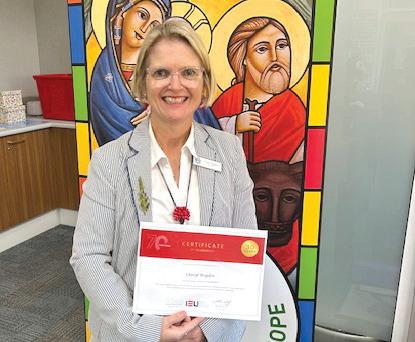
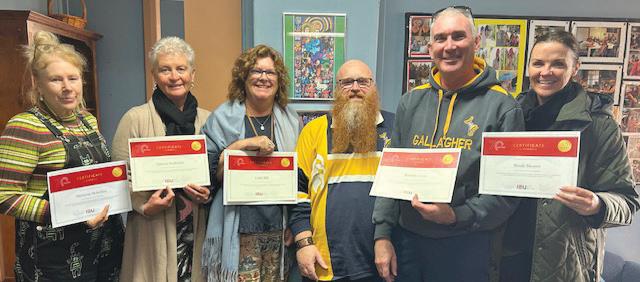

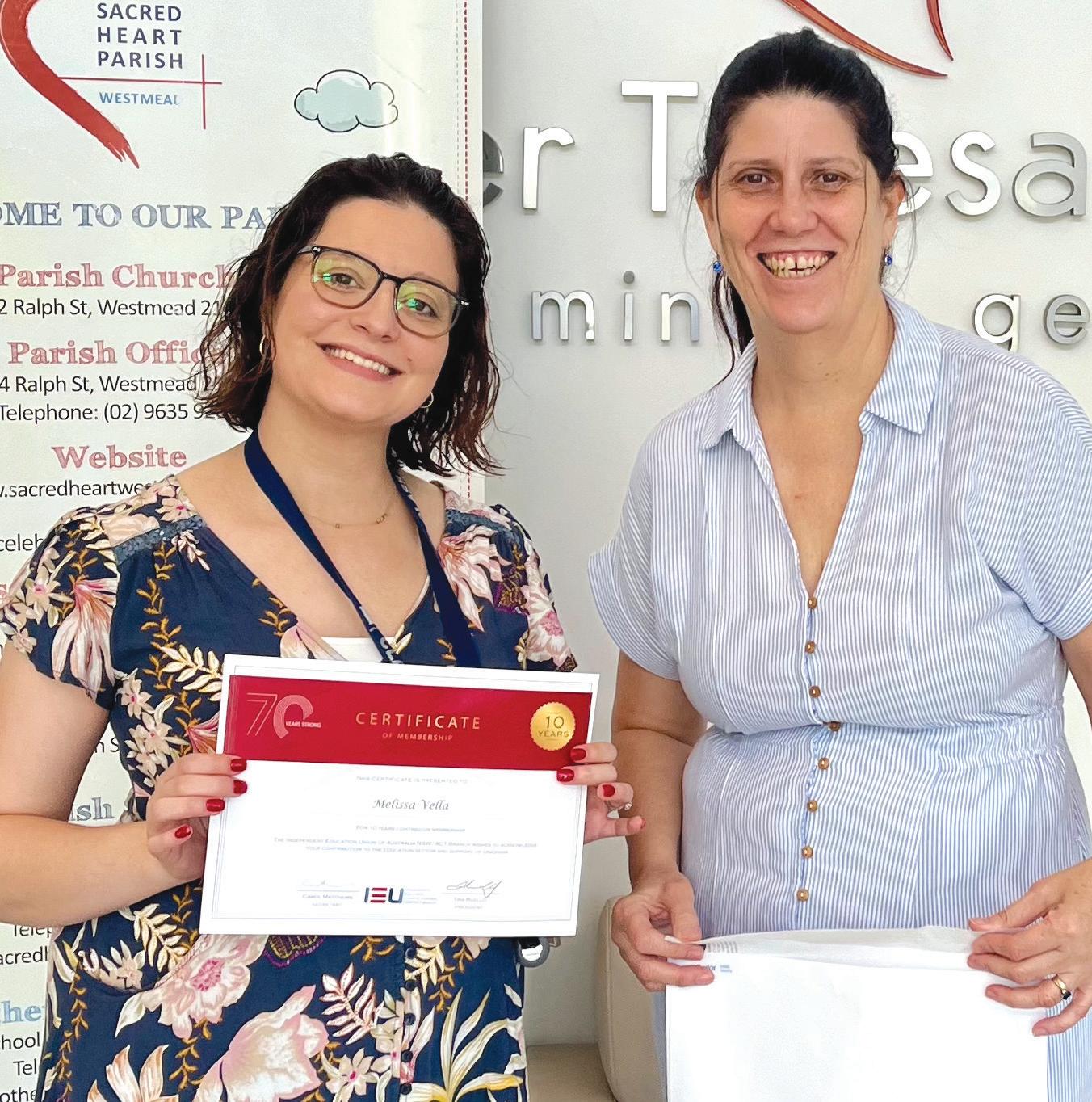
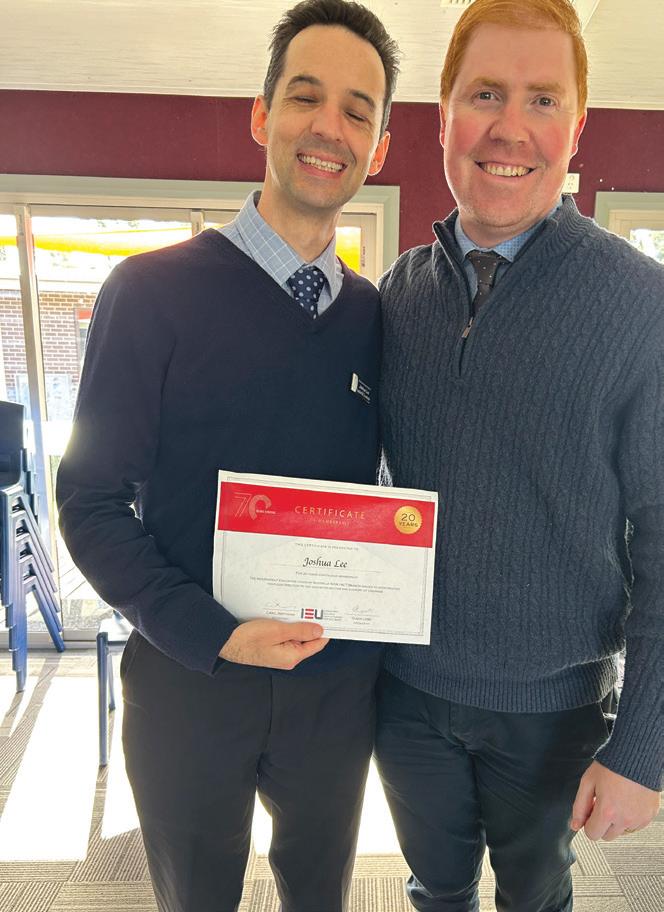
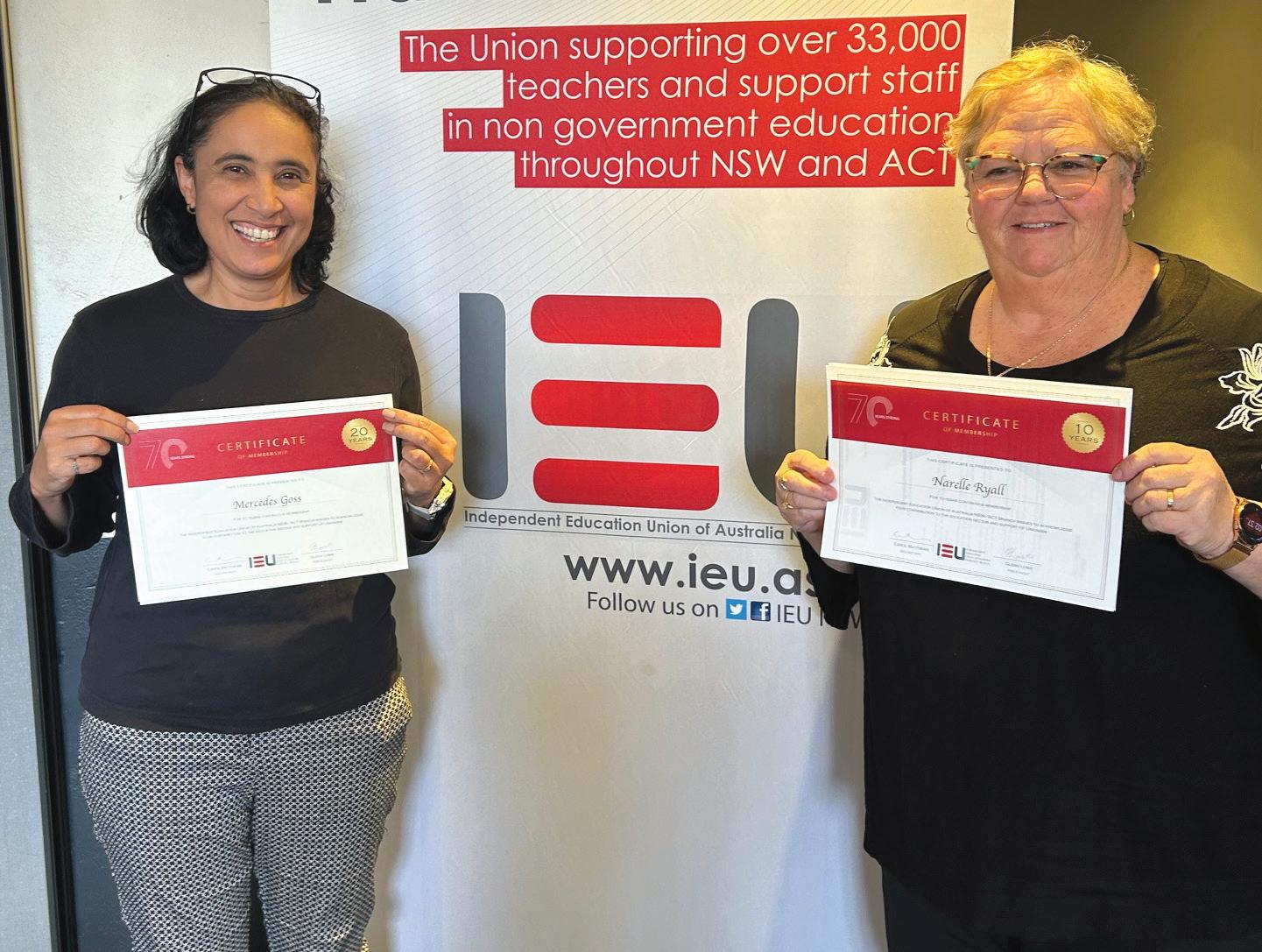
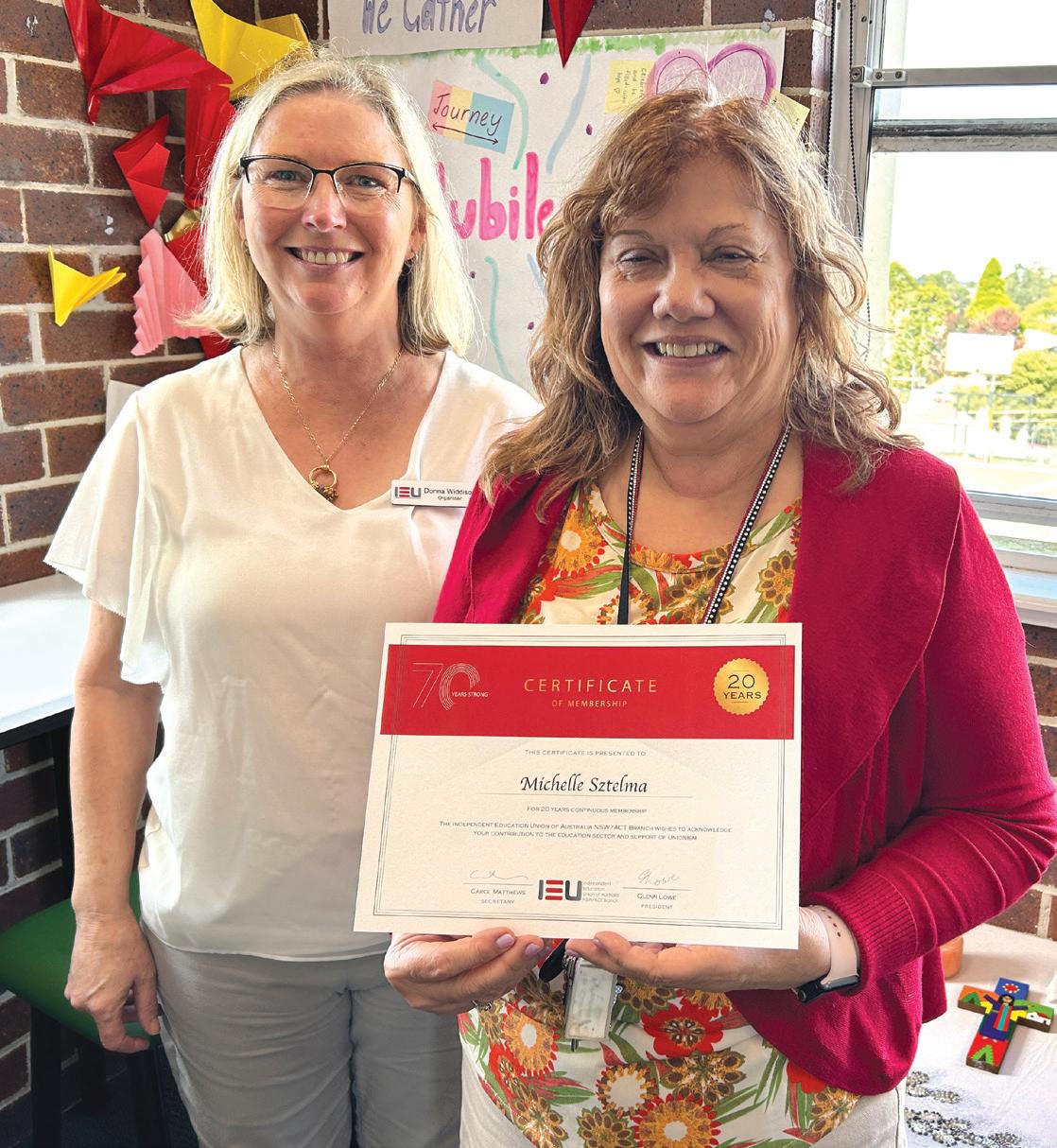
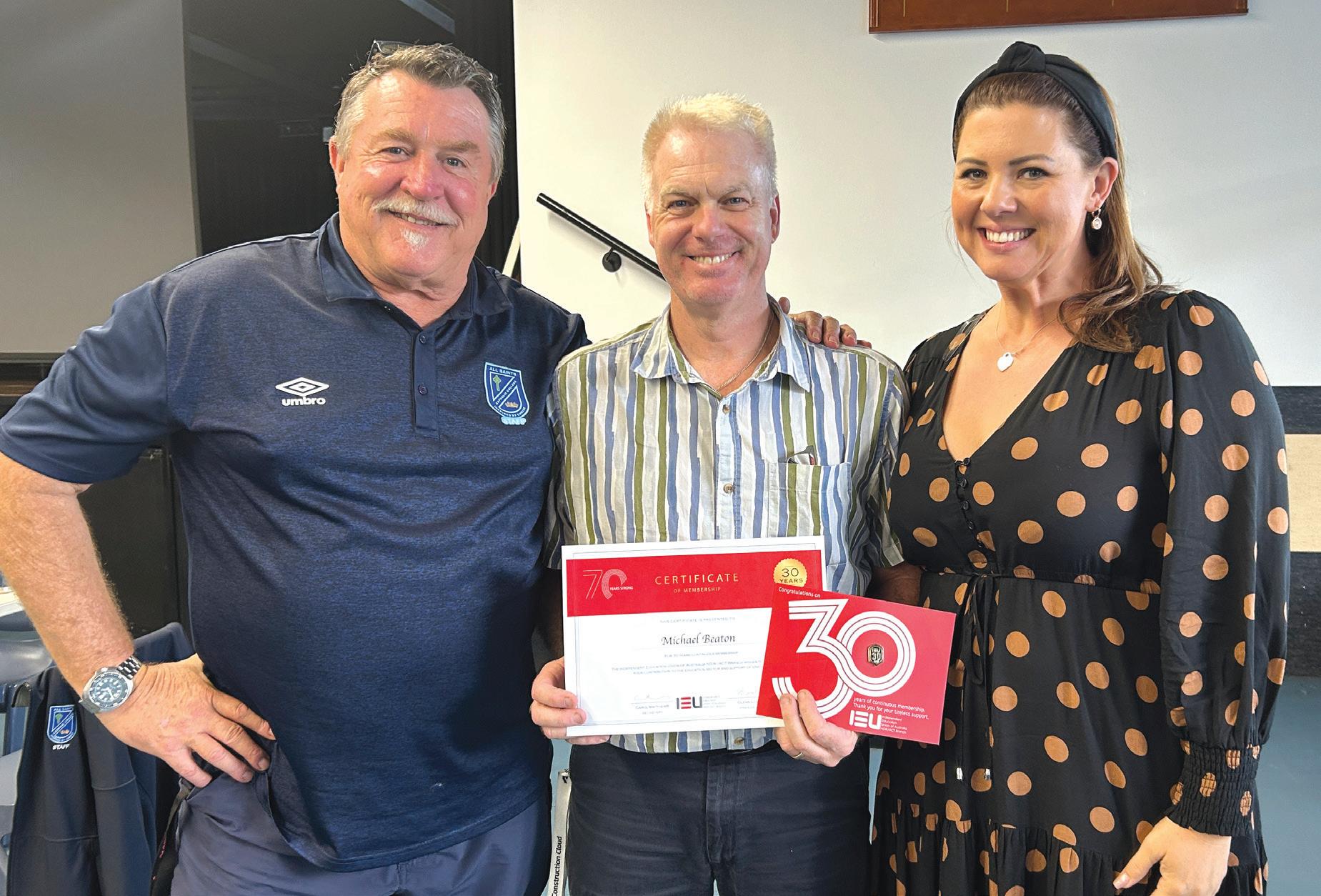
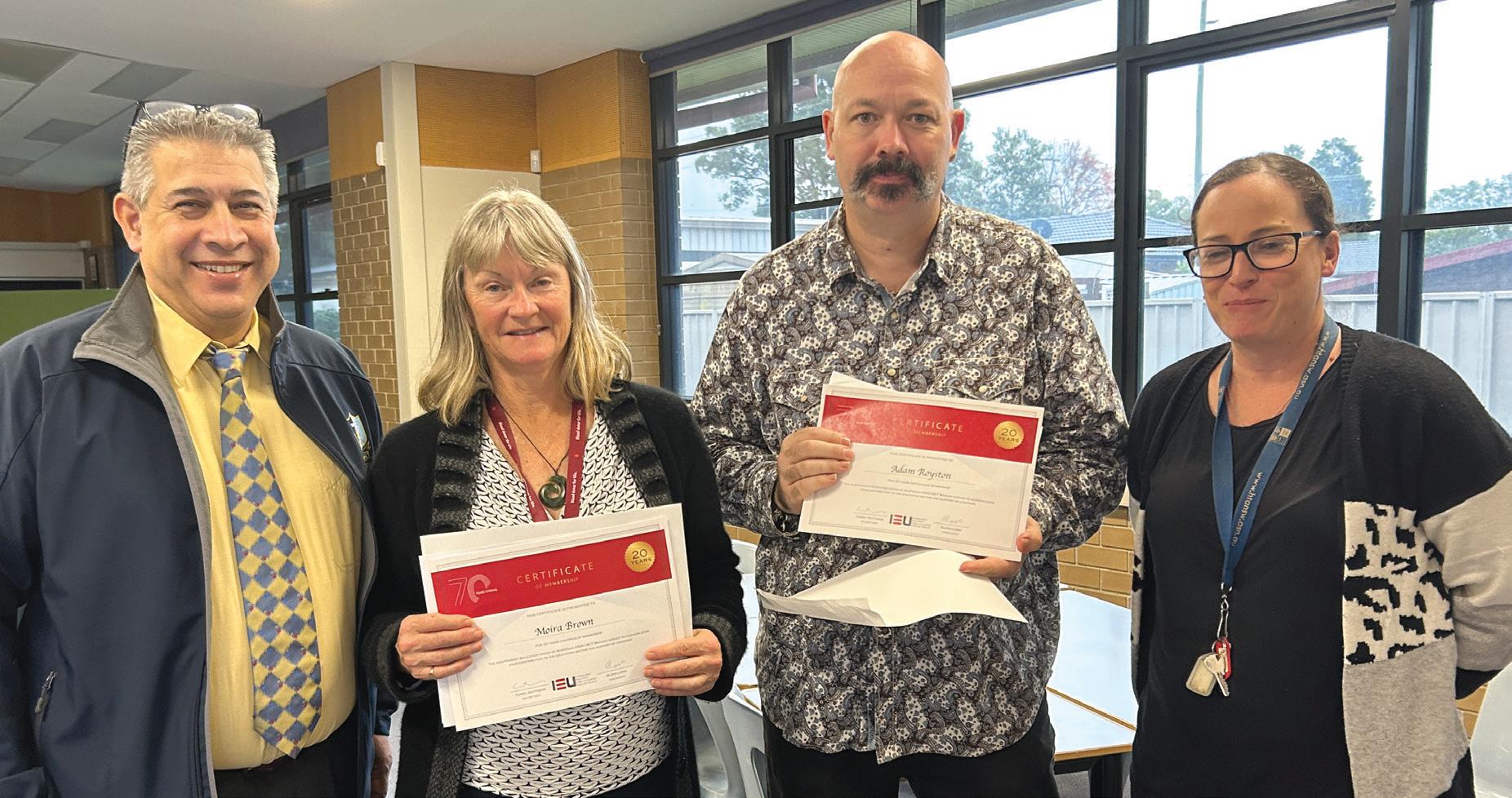
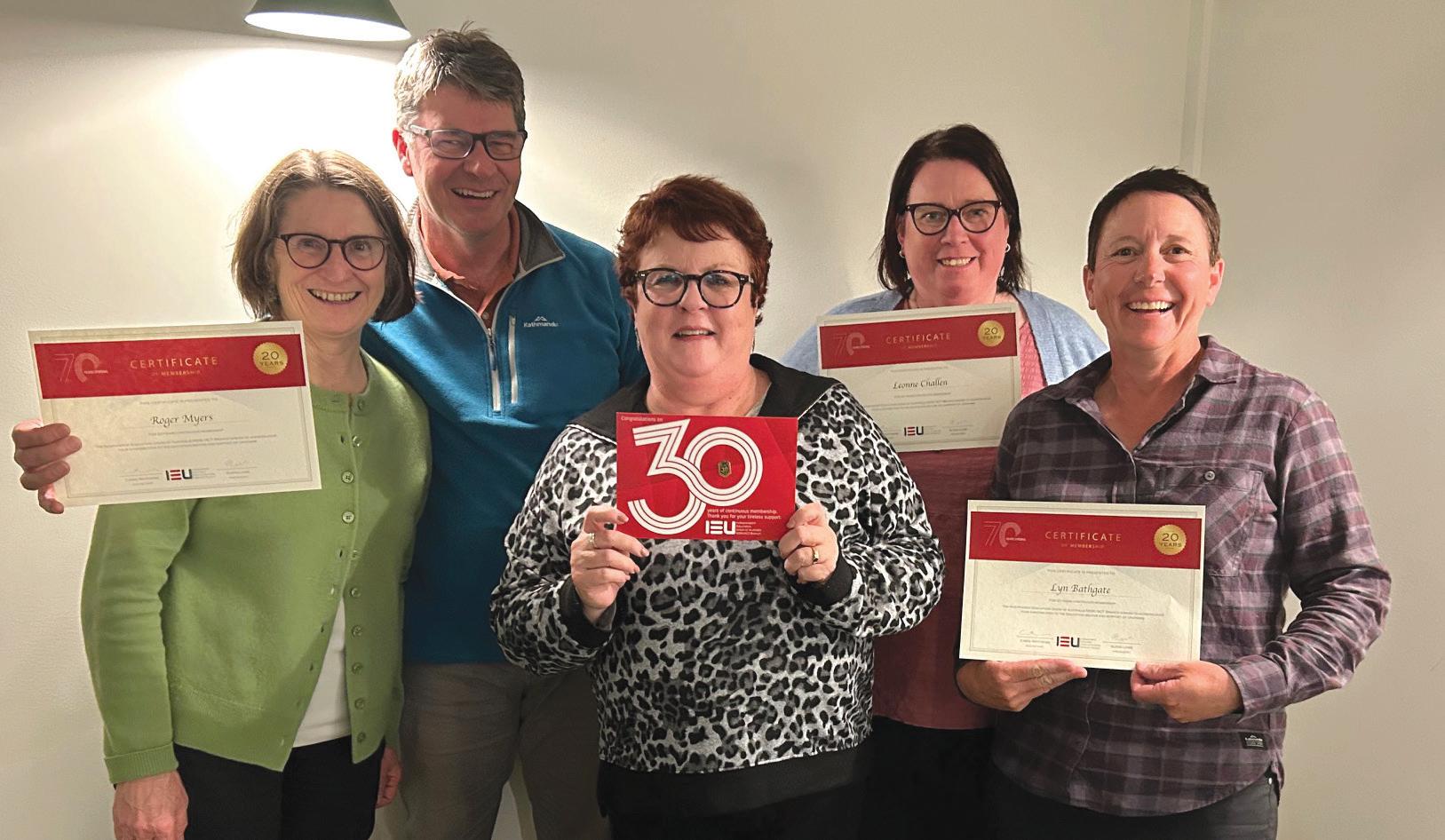
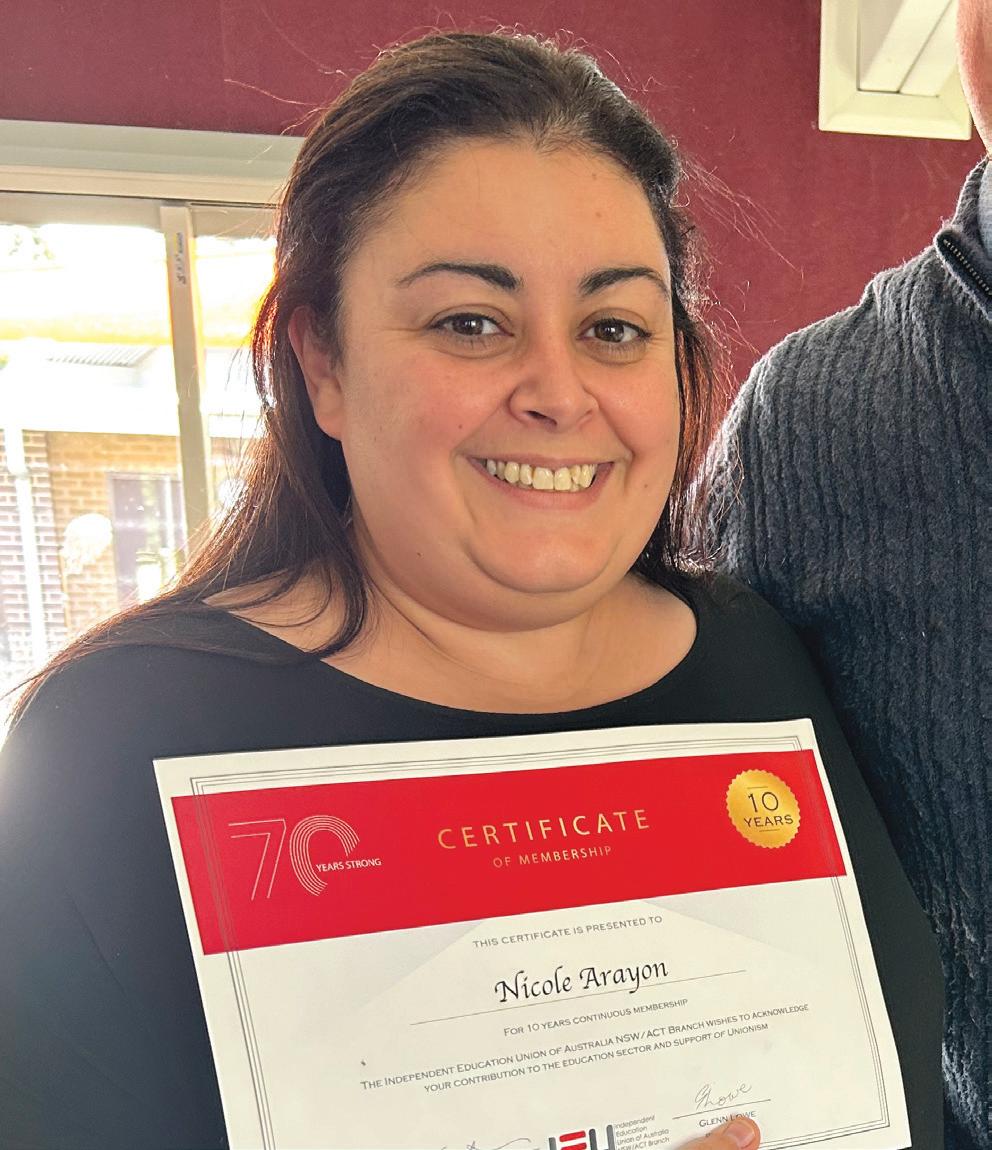
Here is the organisational structure of the Independent Education Union of Australia NSW/ACT Branch. We’re the union for teachers and professional, operational, administrative and support staff and principals in Catholic schools, independent schools, early childhood education and care centres and post-secondary colleges.
Council is the ultimate governing and decision-making body of the IEUA NSW/ACT Branch, bringing together up to 115 members elected by our 20 sub branches every two years. IEU Council also includes 22 members of the IEU Executive (see below), who are elected by the full IEU membership every three years. This means there can be up to 137 members of Council. Council meets four times a year in Sydney, on a Saturday, including an AGM in October, at which the union’s Annual Report is presented. These meetings are an opportunity for members and union officials to exchange information and ideas and to consider and decide the business of the branch (excluding financial management: see Executive, below) in the interests of members. IEU officers (organisers, industrial officers, some professional staff) also attend Council but do not have voting rights. Each sub branch elects delegates to Council every two years (while the number of delegates is determined by the size of the sub branch, most are entitled to elect five or six delegates while principals elect four).
The Executive consists of 22 members who are elected every three years, with current financial members entitled to vote. The Executive is responsible for the branch’s financial management and for overseeing strategic priorities between quarterly Council meetings. The Executive includes the Secretary, Deputy Secretary and two Assistant Secretaries who oversee the union staff in the day-today running of the union, and negotiate for pay and conditions in enterprise agreements for members. These are paid, full-time positions. The Executive also includes honorary positions, including the President, who chairs Council meetings and Executive meetings, a Deputy President and five Vice Presidents who represent the interests of members in the ACT, Catholic systemic schools, independent schools, support staff and early childhood services. The Executive usually meets in Sydney on the first Friday of the month (except January). Additional meetings on urgent matters may occasionally be held online. Members of the Executive are also automatically voting members of Council.
The IEU has about 75 staff across our six offices in Canberra, Lismore, Newcastle, Parramatta, Wollongong and our main Sydney headquarters. We have about 30 organisers and eight industrial officers as well as professional staff including our accounts team,
and
and
and administrative staff,
and
32,000 strong
The IEU has 20 sub branches: 19 geographical sub branches (listed below) and one for principals. All the reps from a particular geographical area meet once a term at their sub branch, along with their union organiser. Sub branches elect a president, deputy president, secretary and committee once a year in Term 1. Sub branch meetings are a way for reps and members to provide feedback to the union about what’s happening on the ground in their workplaces, and to meet and talk to reps from other schools and sectors. IEU organisers also attend to share union updates and information. All chapter reps and IEU members who would like to develop their union activism are warmly invited to attend their region’s sub branch meeting. Each sub branch is represented by four to six delegates to Council (see right). IEU sub branches: Central Coast; Central Metropolitan; Central West, Cumberland; Hunter Valley; Ku-ring-gai; Lansdowne; Metropolitan East; Mid North Coast; Monaro; North Coast; Northern Beaches; Northern Suburbs; North West; Penrith/Blue Mountains; Riverina; South Coast; South East; Southern Suburbs; and Principals.
Reps
Each chapter elects a union representative (or rep, sometimes called a delegate). Some chapters have more than one rep: one for teachers and one for support, administrative and operational staff. Some chapters elect a committee. The rep arranges chapter meetings, keeps members informed of union issues and liaises with your union organiser. They are the first port of call for IEU members in the workplace.
Chapters
A chapter is the group of IEU members in each school or early childhood centre (excluding principals, who have their own chapter). Chapters are the union’s foundation. When new staff join the workplace, members should personally invite them to join the union. The chapter elects one or more reps (see above) and may also elect a chairperson and a secretary.
Members
The IEU has more than 32,000 members in non-government schools, preschools and long day care centres, colleges and other educational institutions throughout NSW and the ACT. Our members are teachers, principals, administrative and support staff, learning support and wellbeing staff, and maintenance and operational staff. They are administrative staff, Aboriginal Education Officers, teacher’s aides, laboratory assistants and library assistants, canteen staff, nurses, counsellors, boarding-house supervisors, bus drivers, grounds-keepers, archivists and many other non-teaching employees in the non-government education sector.

From our humble beginnings in 1954 to the Now’s the Time campaign for better pay and workload transparency in AIS schools in 2024, there has rarely been a dull moment in the IEU’s history.
Along the way, the union has achieved great gains for members and resisted repeated attempts by employers and conservative governments to strip teachers and school support staff of hard-won rights.
But the motivation behind an ambitious project to tell the 70-year history of the union is not merely to take a trip down memory lane.
Advancing the interests of members
The General Secretary of the union from 1981 to 1989, Michael Raper (pictured above right), said the aim of the History Project Group is to further the interests of members by learning the lessons of the past.
“I’ve always thought that you can’t really go
forward unless you know where you’ve come from,” he said. “I want this union to continue to advance the industrial and professional interests of teachers into the future.”
Michael is one of the former leaders of the union – alongside John Nicholson, Dick Shearman, Mark Northam, Patrick Lee and Gloria Taylor – who, along with current Deputy Secretary David Towson, have been meeting for more than a year to discuss the people, victories and setbacks that have shaped the IEU.
Their aim: to oversee and support an analytical history of the union in the context of the social, political and industrial developments of the past 70 years.
stories marking pivotal moments in the union’s history, including huge rallies held jointly with the NSW Teachers Federation in 1996 and 2022 for better pay and conditions.
But there is more work to be done.
“You can’t really go forward unless you know where you’ve come from.”
Last year’s 70th anniversary of the IEU was celebrated in the pages of Newsmonth with
“We’re trying to distil those into themes to inform and guide a history in several different forms,” Michael said. “Not just one overarching history, but in various forms – podcasts, interviews, small essays – so it’s more digestible for members.”
Empowering members
John Nicholson (above left), General Secretary of the union from 1971 to 1977, said two strong themes had emerged during their discussions.
“Empowerment and the fact that the union
New research shows workplace reforms under the Albanese government have boosted wages growth in the past three years – by restoring some bargaining power to working people.
The report, by Professor David Peetz from The Australia Institute’s Centre for Future Work, found real wages had been held back in Australia by policies that reduced workers’ power to negotiate.
“From 2014 to 2022, most government policies took away workers’ bargaining power,” Peetz said. “That changed in 2022 when policies shifted the pendulum back some way towards workers. Now, wages have begun to turn around.”
IEU members made historic gains in the first term of the Albanese government, including stronger rights for reps/ delegates in schools and a 15% pay rise for teachers and educators in the long day care sector (see at right).
The new right to disconnect is also relevant to school staff drowning in unrelenting workloads.
One of Australia’s leading labour-market economists, Peetz said the restoration of workers’ bargaining power since 2022 had also contributed to higher wages growth.
Put simply, joining a union means better pay and conditions.
In The curious incident of low wages growth, Peetz said average wage rises under new enterprise agreements fell from about 3.5% a year in 2014 to 2.5% in 2022 – the period when the Coalition was in power.
But wage increases have been higher in every quarter after December 2022. Data from the Australian Bureau of Statistics (ABS) shows real wages grew 1% in the year to March 2025, which the federal government said was the strongest rate of annual real wage growth in five years.
Peetz said workers did not “play any role in intensifying or sustaining inflationary pressures”.
The Sydney Morning Herald’s economics editor Ross Gittins argues productivity gains also failed to boost workers’ pay – real wages in December 2024 were at the same level as they were at the end of 2011.
“Over those 13 years, the productivity of labour improved by 15%,” Gittins said.
“So none of the benefit of that improvement was shared with workers – contrary to the assurances of businesspeople, politicians and economists that, by some magic process, productivity automatically increases real wages.”
Worse still, Peetz said low wages growth for both union and non-union workers had become normalised “even in tight labour markets”.
“The one countervailing force in recent times has been public policy which, since 2022, has led to some increases in workers’ power,” he said.
Peetz said the recent growth in wages was not simply due to inflation and price surges.
“The increase in wages growth reflects a genuine, recent change in the balance of power, favouring workers and facilitating wages growth,” he said.
Peetz points out recent wages growth had occurred during a period when inflation had fallen from more than 7% at the end of 2022, to less than 3% at the end of 2024.
“The wage gains associated with increased worker power are experienced by union members and non-members,” he said. “But it is likely the latter do not experience as large an increase as union members.”
More members, higher pay
Workplace reforms implemented by the Albanese government have coincided with an increase in union membership – particularly among younger workers.
ABS data shows there were 1.58 million union members in 2024 – almost 200,000 more than in 2022 – amounting to a 12.5% increase.
ACTU Secretary Sally McManus said there were clear economic benefits to joining a union and organising collectively for better pay and conditions.
“Union members earn $251 per week more than non-union members, so around $1600 for union members compared to $1349 for non-union members,” she said. “They also earn $9.30 an hour more.”
had to fight for everything it ever achieved for members,” he said. “They are the two driving themes that I think have come out of our meetings.”
John said the History Project has also reminded him of the importance of the union in times of trouble.
One of the union’s early important victories for members occurred when teacher Haysell Tennant was sacked without reason from St Aloysius’ College in 1975.
Court action by the union led to her reinstatement and established the principle that a “no grounds dismissal” was unfair.
Michael said the legal win in Haysell’s case led to a growth in membership and confidence in the union.
“You could be a member and you could be protected,” he said. “And that led to the union’s capacity to then move into taking industrial action as well.”
Unions, the federal Labor government and employers have worked together to make a new multi-enterprise agreement with 15% pay rises funded by the government.
Is your centre part of this historic deal? It’s not too late.
If your centre joins the new agreement, you’ll get: a 10% pay increase (backdated to 2 December 2024 if your centre joins the MEA and applies for funding by 30 September) another 5% increase from 1 December 2025 paid release to mentor early career teachers, and paid leave to attend union training.
Find out how we can help you get a 15% pay rise. Call the IEU on 8202 8900 or email ececwrp@ieu.asn.au


Early career teacher Georgia Mackson brings team skills to her classroom, writes Andrew Taylor.
Georgia Mackson only took up netball as an adult, but the team skills required on the court have proven invaluable in the classroom.
“I consider all of my classes to be a learning team, in which we all play a part in creating a productive learning environment for each other,” she said.
“The teamwork skills that students develop in sport apply in a similar way to learning in a classroom.”
An English, HSIE and Religion teacher at McCarthy Catholic College in Tamworth, Georgia was awarded the early career teacher prize at this year’s Armidale Catholic Schools’ Spirit of Catholic Education Awards.
Georgia, who is in her third year of teaching, said she was excited and proud to win the award.
“I genuinely love my profession and pour a significant amount of energy into providing students with the skills that will help them to have a successful life,” she said.
“Our system has so many incredible early career teachers, so it’s wonderful to have been selected for this award.”
Passion for literacy
With almost 1000 students, McCarthy Catholic College is the largest school in the Armidale diocese, which covers the New England and north-west regions of NSW and includes 24 schools.
The award judges said Georgia had quickly proven herself to be an outstanding educator since joining the school in 2023.
“Through innovative lesson planning and engaging instructional strategies, Georgia has created an inclusive, dynamic learning environment where students feel motivated and supported,” the judges said.
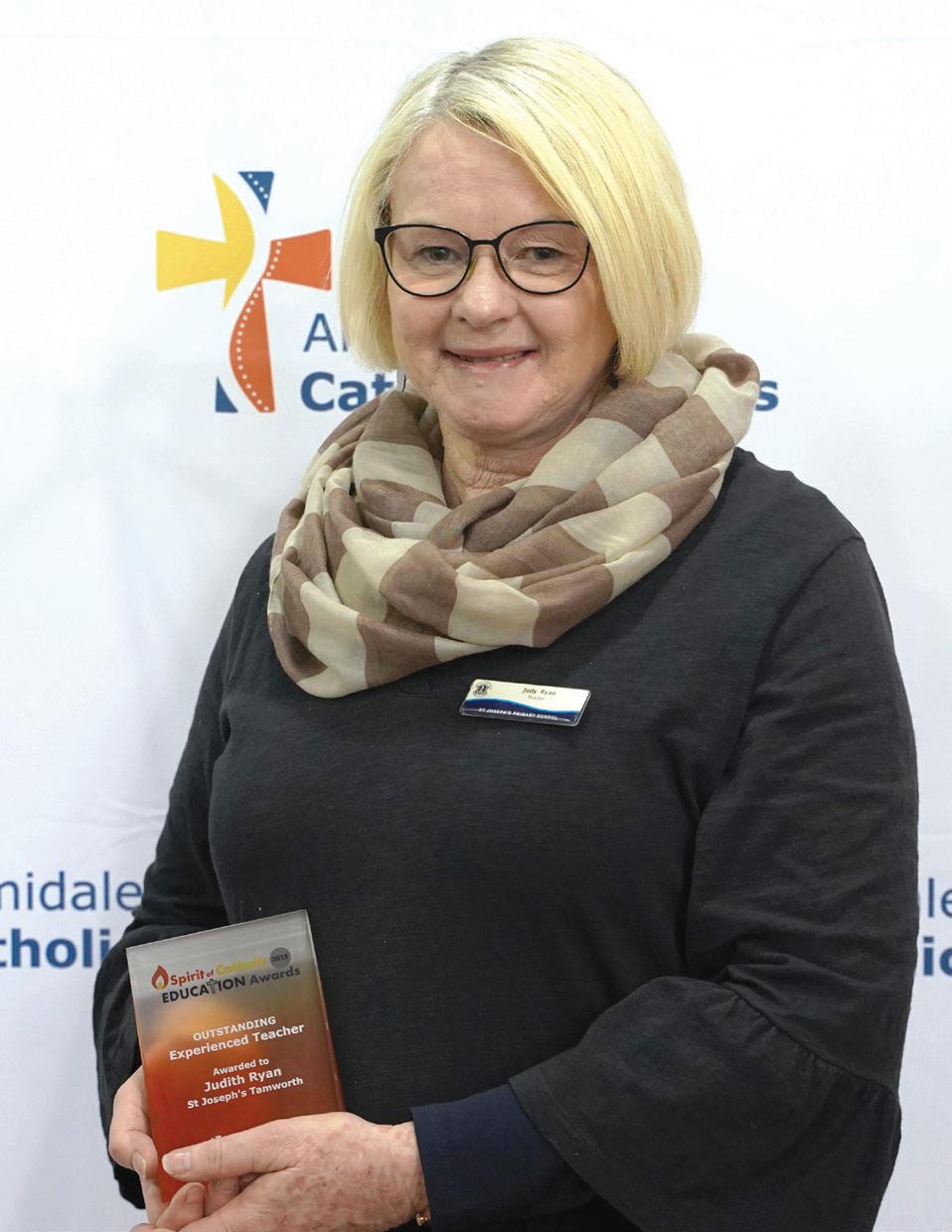
“The curriculum tended to be more prescriptive and focused on content delivery,” she said. “As teachers we were the primary source of knowledge.”
More than four decades later, Judy’s class at St Joseph’s Primary School in Tamworth could not be more different.
Alongside two colleagues, Judy teaches 52 Stage 1 (Years 1-2) pupils in what she called a “more student-centred and inquirybased approach”.
“We are now working in collaborative spaces, sharing responsibility for student learning and creating a richer learning experience,” she said.
Devoted teacher
A teacher at St Joseph’s since 1995, Judy was awarded the experienced teacher prize at this year’s Armidale Catholic Schools’ Spirit of Catholic Education Awards.
Judy said she felt grateful to be nominated for the award and “validated knowing my efforts are recognised and appreciated by my school and diocese”.
“I’m proud of my hard work and dedication to teaching, and hopefully the positive impact I’ve had on students’ lives over the years,” she said.
The award judges said Judy was a devoted teacher who had contributed to the development and education of hundreds of students at St Joseph’s since 1995. She has also taught at Catholic schools in Narrabri, Broken Hill, Dunedoo and Werris Creek.
“Judy’s ability to personalise learning, based on her understanding of her students’ academic needs, personal learning styles and interpersonal dynamics, has been a hallmark of her career,” the award judges said.
They also said Judy was an outstanding source of support and guidance for her colleagues: “She has mentored and supported numerous teachers throughout her career, consistently demonstrating a commitment to professional growth and lifelong learning.”
Georgia has a strong passion for literacy and especially teaching writing. She said it was rewarding to help students develop skills that will assist them for the rest of their lives.
“I love helping my students to become better and more confident writers,” she said. “Seeing their growth over the year of learning makes me feel like I am making a difference.”
Georgia’s love of language extends to learning Gamilaraay, a First Nations language spoken in the Tamworth region.
“Visiting sacred sites and learning from Aboriginal people about language and culture helps me to more deeply understand how I can be an ally and advocate for Aboriginal students at my school,” she said.
Georgia, whose parents are both teachers, said she was “really unsure” about what career to pursue after school.
“I then spent a gap year teaching dance and working as an education assistant,” she said. “I knew that I loved English and history and slowly realised that I enjoyed teaching just as much.”
An IEU member since 2023, Georgia said her father sent her a message suggesting she join the union on her first day of teaching.
“He has been a member for his whole career and has always spoken about the value of being a part of it,” she said.
Georgia said she valued the union’s role in protecting teachers and fighting for fair pay and conditions.
“I like having a union representative at school that I can go to and ask questions about my rights,” she said. “I feel really supported by this.”
The support and advocacy work of the union is invaluable for early career teachers, she said.
“Adjusting to full-time work, and especially the large workload of a teacher, can be really difficult as an early career teacher,” Georgia said.
“I found it helpful to know exactly how many hours I should be teaching in a cycle and felt reassured that the union will help to protect this.”
Fronting a classroom when you’re tired or run down is not easy. But, she said: “As the adult in the room, it is my job to model the emotional regulation that I hope my students can develop.”
However, Georgia takes issue with the sometimes negative portrayal of teaching in the media.
“Teaching poses different challenges to other careers, but the rewarding parts significantly outnumber the difficult ones,” she said.
Judy said developing long-lasting friendships with her colleagues was one of the rewards of teaching. Nurturing students, both academically and personally, is another source of satisfaction.
“It’s about connecting with students, seeing them mature, offering them guidance and a safe space,” she said.
“It’s also those lightbulb moments when a student, who has been struggling, suddenly understands a concept.”
The challenges of teaching include maintaining a healthy work-life balance, managing a heavy workload that frequently extends beyond school hours, catering to diverse learning needs, and creating and maintaining a positive, productive learning environment.
An IEU member since 1981, Judy said she was initially encouraged to join the union for support and protection.
Union membership had led to improved working conditions including RFF and leave provisions, pay rises, smaller class sizes and health insurance, she said.
Other changes Judy has witnessed since first stepping into the classroom include curriculum reforms, more opportunities for teacher professional development, greater expectations from parents and, of course, technological advancements.
When Judy studied teaching at the Armidale College of Advanced Education, there was one room in the library with about 10 computers for students.
“Today, our students each have their own device, as technology is deeply embedded in our daily teaching,” she said.
IEU reps share how they’re building strong chapters. Strong chapters make for a strong union and therefore greater bargaining power for all members.


Courtney Smith is a science teacher at Arden Anglican School in Epping, which welcomes students from preschool to Year 12.
A teacher for three and a half years, Courtney has been an IEU rep for most of that time.
Courtney was particularly energised by the IEU’s “Now’s the time” campaign for pay rises and better conditions for teachers and professional and operational staff in independent schools.
“It’s really exciting,” she said. “It’s awesome that we’re getting recognised for all the extra work we do in our schools.”
In new multi-enterprise agreements covering staff in about 240 independent schools, finalised in March 2025, members gained an important breakthrough around workload transparency.
Employers must now advise teachers of their usual face-to-face hours per week or cycle, as well as general requirements around extracurricular duties.
Courtney noticed the campaign also inspired her colleagues, with many more joining the IEU, but she’s still keen to help her chapter grow. “We still have room for improvement,” she said.
When she’s not teaching or repping, Courtney is likely to be up, up and away: a keen traveller, she has already visited all seven continents.
Jessica Divis is the rep for professional and operational staff at Tara Anglican School for Girls in North Parramatta, where she is the payroll manager. “Yes, I’m good at numbers,” she said.
After attending reps training in the IEU’s Sydney office in late 2024, Jessica has now been a rep for the best part of a year. “It’s about everybody’s rights,” she said. “Protecting everyone’s rights, whether you’re a teacher or part of the non-teaching staff.”
Jessica would like to see the professional and operational staff at her school achieve improved conditions around long service leave and personal leave. “We work as hard as everyone else, and we have families who get sick too,” she said.
Following the “Now’s the time” campaign for pay rises and improved conditions for teachers and other staff in about 240 independent schools during 2024, professional and operational staff gained pay rises of 4% in 2025, 4.5% in 2026, and 4% in 2027, along with improvements to paid parental leave. These are strong wins, but there is always more to do.


Julian Stewart teaches at James Sheahan Catholic High School in Orange, where he’s something of a jack-of-all-trades.
“I’m employed as a visual arts and Japanese teacher, but my training is in science – so I teach all of it,” he said.
He’s in his ninth year of teaching and he’s been a union member for all nine years. He’s also in his third year of being a rep.
Julian takes the slow and steady approach to building the chapter at his school. “Case by case – really slowly,” he said. “Really slowly.”
But this year he’s had a bit of a breakthrough, and it’s all about a personal approach.
“I went to a new teachers’ meeting, and I asked for time to talk to them about the union. And so I talked to them – all our new staff members,” he said.
“I’ve also been approaching people who have talked to me about the union before, but not quite committed. And I’m seeing people join up – five so far this year. It’s very exciting.”
The big issues, as Julian sees it, are class sizes and workloads. “We’d really like to see the education system set us up for success,” he said.
Julian also wears a third hat. “I’m a full-time teacher, a union rep, and I work at the local aquarium store,” he said.
“It was my childhood dream – I always wanted to work at the fish shop, so when the opportunity came up, I just had to do it.”
While he may have initially joined the union because of “a mild paranoia about employers”, Julian also has union in his veins. “I’ve always been raised to trust in the union,” he said.
Harry Vella teaches science and STEM at McCarthy Catholic College in Tamworth.
A relatively new teacher, Harry’s been an IEU member since he first started teaching at a Catholic school in Campbelltown.
Both of Harry’s parents are teachers and both also teach at McCarthy. “Ever since I started my teaching degree, they were like, ‘join the union’,” Harry said. “They said, ‘you know, they’ve got your back’.”
Like many of his colleagues, Harry would like to see some workload alleviation this year. “I’m still at the earlier end of my teaching career, and I’m already fairly tired,” he said.
“I’ve got a young family, and trying to find that balance between work and life can be quite tough, and a little draining, and my wife notices that.”
When the position of rep came up at his school, Andy Barnett said he “felt all eyes turn to me”.
“I’ve been told that I’d be a good rep. Someone labelled me a ‘rabble rouser’ and I don’t mind that title.”
A Year 6 teacher at Korowal School in Hazelbrook in the Blue Mountains, Andy nominates workload creep – “just those little incremental requests” – as one of the main challenges faced by teachers at his school.
Andy said his “kneejerk reaction” is to agree to take on such requests: “Only later, do you realise there are only a certain number of hours in the day.”
“Teaching is a creative job,” he said. “When you’re presented with a problem, you instinctively start thinking of solutions.”
At a training session for new reps, Andy picked up tips for supporting fellow members.
“Today’s training has helped me to see our legislative rights, our workplace agreement rights
and where exactly I can direct members when they come to me with concerns,” he said.
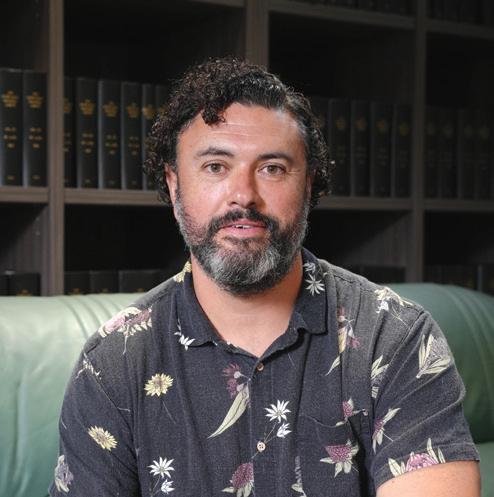

“I feel empowered to be able to respond to members. I hope they feel they can approach me and are comfortable raising their concerns.”
An IEU member for two years, Andy said he had always wanted to join the union.
“I believe in the power of the union in representing workers and making sure we get the things we are entitled to and deserve,” he said.
Outside of work, Andy is passionate about making art and music – “although I haven’t been able to do much lately as a teacher”.
A guitarist and singer, Andy said: “I’m trying to get myself back into playing and gigging more often.”
Evan Connell is the rep at New Madinah College in Young, an Islamic school that welcomes about 120 students from kindergarten to Year 10 and has about a dozen staff.
While many people know Young as the “cherry capital” of NSW, what they may not know is that the town, on the state’s southwest slopes, is also home to a thriving Muslim community.
Evan, who provides IT support at New Madinah College, said he became the rep to “fill a gap”.
Evan’s background is in networks and hardware, as well as digital marketing.
His first task at New Madinah was to set up a classroom of about 30 computers on a very tight budget. “So I got these old computers with fast hard drives, and put this Linux-based program in, and did it for just a little bit over $2000,” he said.
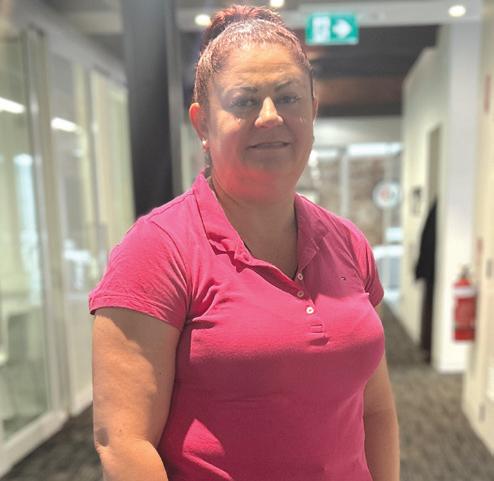

Jessica became an IEU member for one simple reason: “To have a voice for the union people in the workplace,” she said.

When trying to switch off, Harry turns to a galaxy far, far away. “I’m probably the biggest Star Wars nerd there is,” he said.

“I’m a science teacher. I’ve always loved science, and I love science fiction and space, and the Jedi are cool,” he said. His favourite Star Wars character? “That’s a tough one, and maybe it’s a cliché, but it has to be Obi-Wan Kenobi,” he said. Obi-Wan was played by Sir Alec Guinness in the original 1977 movie and Ewan McGregor in the three prequels. What more can we say? May the force be with you.
New Madinah College, Young
From there, Evan began developing a program to replace Windows 10 on some machines as it will no longer receive security updates or technical support from Microsoft after October.

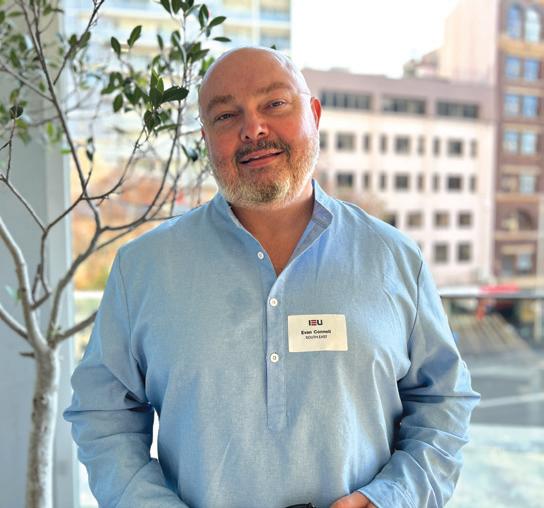
Evan said his program includes a web browser, word processing, a spreadsheet app and video editing, and it can interact with Microsoft programs. “It’s networkable, doesn’t require internet connectivity, and it’s cheaper,” he said.
To build the union chapter at his school, Evan said he simply has a friendly conversation with other staff members. “It’s great to be able to support colleagues and build a sense of community and solidarity in the workplace,” he said.
Around the Globe brings you international news about injustices and workers’ rights. If injustice exists anywhere, it exists everywhere.

The
Rights
by the International Trade Union Federation, found a sharp escalation in violations of rights such as free speech, freedom of assembly and collective bargaining as well as access to justice.
The right to strike was violated in 87 per cent of countries, while the right to the legal registration of unions was impeded in almost 75 per cent of countries.
Australia was one of just three countries that improved its ratings, thanks to industrial reforms implemented by the Albanese government.
The Index also identifies a troubling trend where democratic institutions are undermined often by far-right leaders and influential billionaires.
In the United States, for example, the Trump administration has stripped union protections from federal employees and weakened labour boards.
Less than 1 per cent of the global population controls nearly half of the world’s wealth. “This concentration of economic power allows a small group of billionaires to exert outsized influence over global decision-making, including on labour rights and protections, which directly affect the lives of the workers who sustain the global economy,” the Index said.
2026 FIFA World Cup: Workers rights under attack
With a year to go before the 2026 FIFA World Cup kicks off across the United States, Canada and Mexico, human rights groups are warning of growing attacks on workers, migrants and democratic freedoms in all three host countries.
In the US, Republican-led states have pushed through antiunion laws and cracked down on migrant rights, reports Human Rights Watch. Some states have also passed laws restricting the right to protest.
Anti-union laws and attacks on free speech are also impacting schools and university campuses, limiting teachers’ rights to organise and speak out on social justice issues.
Canada faces criticism for poor protections for migrant workers in sectors such as agriculture and hospitality where exploitation is rife.
In Mexico, violence against journalists, unionists and activists continues with little accountability.
FIFA’s own human rights policy promises to prevent abuses linked to the tournament, but concrete action from the international body that governs soccer and governments has fallen short.

Human rights groups are warning of rising attacks on workers, migrants and democratic freedoms in all three 2026 FIFA World Cup host countries.
Unions across North America are calling for fair pay, safe conditions and the right to organise – especially for the thousands of workers who will build, clean, cook, transport and provide security for the World Cup.
This is a critical moment for solidarity and collective action to ensure workers’ voices are heard and rights are protected.
As educators, we have a vital role to play in making sure the World Cup is not held at the expense of dignity and justice for working people, students and communities.
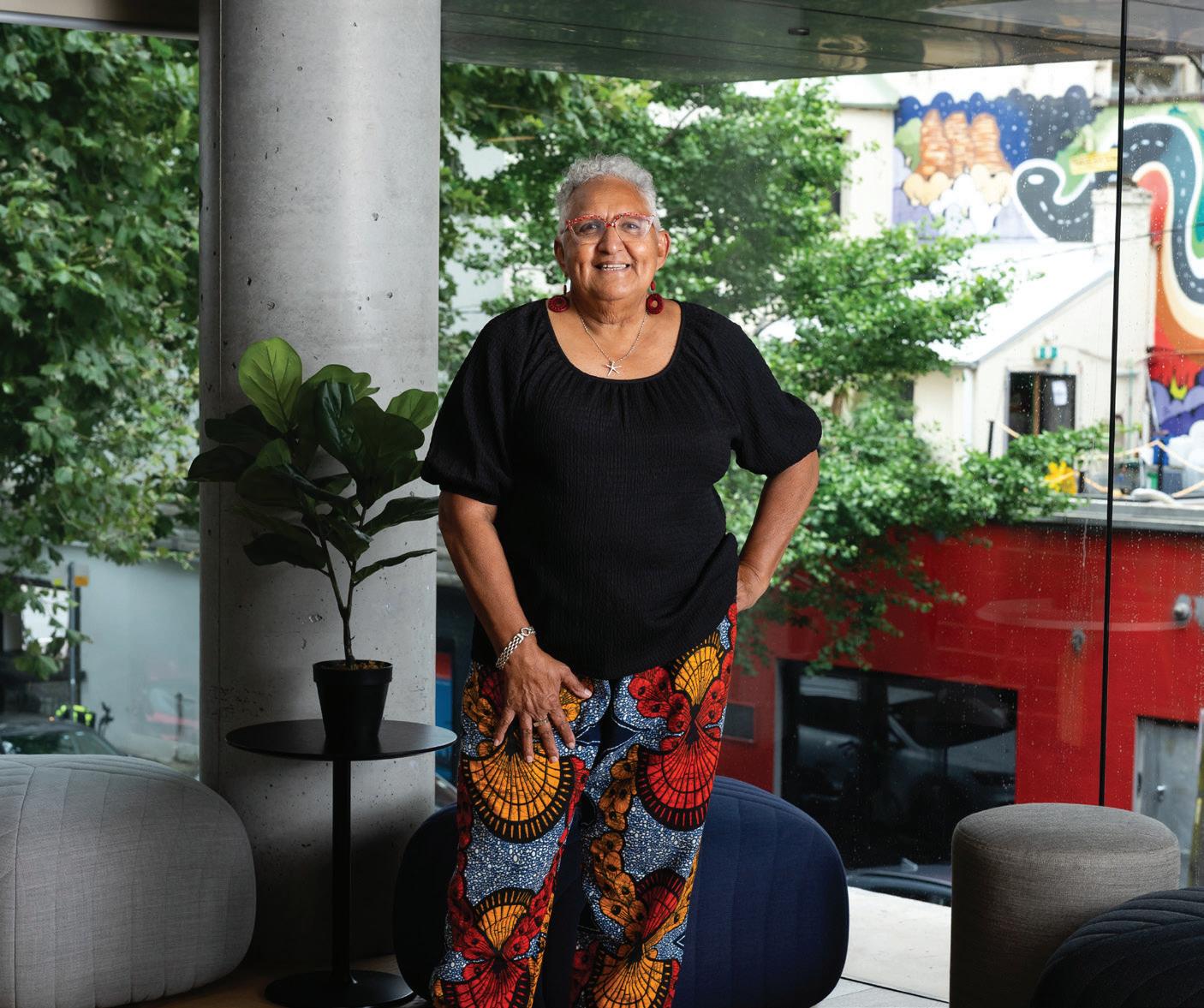



Every year the IEU invites members at schools, colleges and early childhood centres to apply for a number of grants, sponsored by Teachers Mutual Bank, to develop sustainability initiatives.
TMB and the IEU have a proud history of funding education projects focused on sustainability.
Past grant-winning projects include habitat and biodiversity conservation, tree-planting, composting and vegetable gardens, water and energy saving initiatives, waste and recycling.
Grants have also been awarded to projects that draw on Aboriginal and Torres Strait Islander connections to land, community and the local environment.
Applications for this year’s environment grants open on 21 July.
We speak to two recipients of the 2024 Environment Grant to find out how they used the grant to implement their sustainability project.
Compost champions
Evans Head-Woodburn Preschool, Evans Head and Woodburn
Changing how students, their families and staff think about waste is the goal of the Evans HeadWoodburn Preschool’s Compost Champions project.
Preschool director Cath Gillespie said the service used its $2500 grant to purchase composting equipment to create “a hands-on, sustainable learning experience for our children”.
“They are discovering that the food they bring to preschool – and the waste it generates –doesn’t have to end up in landfill,” she said.


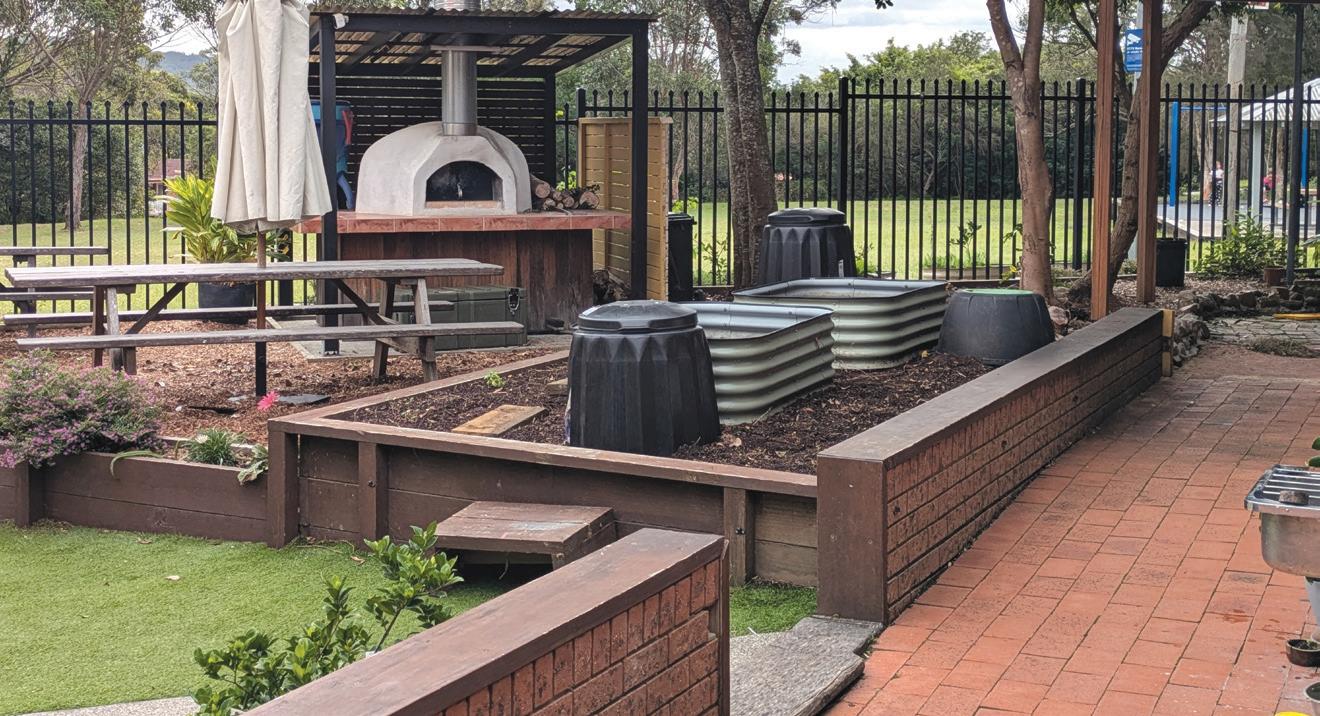
“With a little thought and effort, it can be transformed into something valuable, like compost to grow fresh, nutritious food.”
An IEU member since 2019, Cath said students were involved in every step of the Compost Champions project “from assembling compost bins and identifying where food scraps go to cutting up food waste for our worms”.
Cath said students at the preschool on the NSW North Coast independently managed the composting process under the guidance of a sustainability champion.
“Since the composting stations were set up, we’ve seen genuine enthusiasm and engagement from the children,” she said.
“They’re asking questions, initiating conversations and showing curiosity about how composting works and why it matters.”
Cath said students were learning firsthand about the impact of waste and sustainable practices.
“This knowledge extends beyond the classroom through family engagement initiatives like No Waste July and making beeswax wraps to reduce plastic use at home,” she said.
Cath said preschool staff had embraced the learning journey and were rethinking waste in their own routines, such as reusing hand towels and shredded paper when planning and building new garden beds.
She said composting routines were now a natural part of “our daily rhythm”.
On Tube it Tuesday, students add compost tubes and worm buffets to garden beds, while Worm Wednesday involves feeding and observing the preschool’s worm farms.
“These regular activities reinforce environmental responsibility in a way that’s engaging and easy to follow,” she said.
Cath said the preschool also plans future initiatives such as creating reuseable bags for children’s lunches as part of Waste-Free July and encouraging families to collect rubbish at parks and beaches.
“These projects deepen our commitment to sustainability while fostering community involvement and creativity,” she said.
Cath said one of the main challenges is finding a staff member to be a “committed Compost Champion” who leads the project, supports their peers and keeps the composting process consistent.
“As with any new system, it takes time and teamwork to embed routines, sort waste correctly and maintain engagement across the team,” she said.
Water saver
Central Coast Montessori Primary School, Bateau Bay
An ambitious project to become carbon neutral prompted the Central Coast Montessori Primary School at Bateau Bay to apply for an environment grant last year.
The school was awarded a $2000 grant for its Water Saver project, which aims to install water tanks to collect and filter rainwater to maintain gardens.
Lead teacher Alex Coutts said the school planned to use the water to maintain a sustainable garden of seasonal vegetables and fruits.
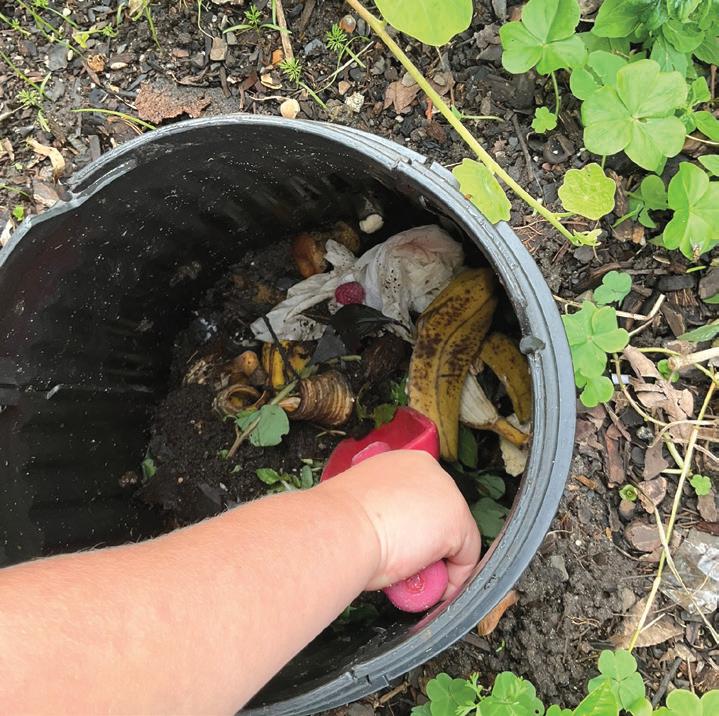
An IEU member since 2022, Alex said the program offered “real-world engagement” with the syllabus, with students planning and organising activities such as fundraisers and data collection.
“We plan to incorporate as many native and Indigenous food plants into our gardens,” he said. “Children will help grow and maintain the garden as well as learn the fundamentals of agriculture.”
A community group of parents and another group of children had been set up to implement the Water Saver project.
“We have emptied space for our new garden beds and water tanks,” Lily, aged 11, said. “We have ordered two of the smaller tanks and are raising money for our final larger water tank.” Elijah, a 10-year-old student at the school, said the environment grant has helped the school pay for expensive materials needed for the project.
Eleven-year-old Hailey said: “We are very grateful for the grant because this project really interests us and unfortunately, we don’t have the required money.”
Fellow student Leilani, 10, said the vision for the project is to “collect water in a way that is good for the planet, in an energy efficient way”.
Students are also making and selling crafts to raise money for the project.
“It will enhance our learning by teaching us how to earn money in an efficient way,” Aaliyah, 11, said. “We can also learn all about sustainability and how to save water and other important things on the Earth.”
Bring your sustainability initiatives to life! The IEU and Teachers Mutual Bank are o ering a minimum of six grants valued at up to $3000 each.
We invite members to apply for our 2025 environment grants, proudly sponsored by Teachers Mutual Bank (TMB).
TMB and the IEU have a strong history of funding education initiatives that kickstart sustainability projects.
Applications open: Monday 21 July 2025
Applications close: Friday 10 October 2025
Winners will be contacted on Tuesday 21 October 2025, with a formal announcement at the IEU AGM in Sydney on Saturday 25 October.
To apply, scan the QR code below and ll out the form.
For more information, email: environment@ieu.asn.au

SCAN THE QR CODE TO APPLY NOW




• you must have spent the money yourself and weren’t reimbursed it must directly relate to earning your income
• you must have a record to prove it.*
You can only claim the work-related portion of an expense. You can’t claim a deduction for any part of an expense that does not directly relate to earning your income.
* You can use the myDeductions tool in the ATO app to keep track of your expenses and receipts throughout the year.


You can’t claim the cost of normal trips between home and work, even if you live a long way from your usual workplace or have to work outside normal business hours – for example, attending parent-teacher interviews. You can claim the cost of using a car you own when you drive: directly between separate jobs on the same day (but not if one of the places is your home) – for example, travelling from your first job as a teacher to your second job as a tutor to and from an alternative workplace for the same employer on the same day – for example, driving from your regular school to another school to moderate exam results from home directly to an alternative workplace – for example, travelling from home to a training venue to attend a workrelated training course.
In limited circumstances, you can claim the cost of trips between home and work, where you carry bulky tools or equipment for work. All of the following must apply: the tools or equipment are essential to perform your employment duties and you don’t carry them merely as a matter of choice the tools or equipment are bulky – meaning that because of the size and weight they are awkward to transport and can only be transported conveniently using a motor vehicle there is no secure storage for the items at the workplace.
If you claim car expenses, you can use the logbook method or the cents per kilometre method to calculate your deduction.
If you claim your work-related car expenses using one of the above methods, you can’t claim any further deductions in the same tax return for the same car. For example, petrol, servicing or insurance costs.
Clothing and laundry expenses (including footwear)
With a few exceptions, clothing can’t be deducted as a work-related expense.



You can’t claim the cost to buy, hire, repair or clean conventional clothing you wear for work, even if your employer requires you to wear it and you only wear these items of clothing at work. ‘Conventional clothing’ is everyday clothing worn by people – for example, sports clothing or business attire. You can claim the cost to buy, hire, repair or clean a compulsory uniform. The uniform must be explicitly required by a workplace agreement or policy. You can’t claim a deduction if your employer pays for or reimburses you for these expenses.

You can claim self-education and study expenses, including the cost of conferences, seminars and training courses, if your course relates directly to your employment as a teacher and it:
• maintains or improves the skills and knowledge you need for your current duties results in or is likely to result in an increase in income from your current employment.

For example, a course in working with children with special learning needs. You can’t claim a deduction if your study is only related in a general way or is designed to help you get a new job.

You can claim a deduction for running expenses you incur directly as a result of working from home. You must:
• use one of the methods set out by us to calculate your deduction keep the correct records for the method you use.

You can’t claim:
coffee, tea, milk and other general household items, even if your employer provides these at work costs that relate to your children’s education, for example, iPads, desks, subscriptions for online learning the decline in value of items provided to you by your employer – for example, a laptop or a phone any items or expenses your employer pays for or reimburses you for, including setting up your home office.

You can claim the work-related portion of other expenses that relate to your employment, including:
union and professional association fees
phone and internet costs, with records showing your workrelated use
excursions, school trips and camps
• first aid courses if you are the designated first aid officer
teaching aids
technical or professional publications.

You can’t claim private expenses such as: gifts you purchased for students meeting students’ personal expenses – for example, paying for lunch, excursions or school books flu shots and other vaccinations, even if you’re required to have them for work.

You can’t claim a deduction if the cost was met or reimbursed by your employer.
This is a general summary only For more information, go to ato.gov.au/teacher or speak to a registered tax professional.
It’s a new financial year, and tax time is upon us. Every year, the Australian Taxation Office (ATO) shares a range of tips and resources to help simplify tax time for teachers and education professionals.
What to claim
From self-education, union fees, school supplies and workingfrom-home costs – the ATO’s tailored occupation guide provides a list of common deductions for teachers and school staff. It includes information on the income you’re required to declare, and the records you need to keep.
Keep your receipts
Keeping the right records is essential. The myDeductions tool in the ATO app is useful for storing receipts and keeping track of your records.
When to lodge
The best time to lodge is from late July, when information from employers, banks and health funds has been included automatically online. Most tax returns lodged online take about two weeks to be processed.
More information ato.gov.au/individuals-andfamilies/income-deductionsoffsets-and-records/ deductions-you-can-claim/ occupation-and-industryspecific-guides
In early June, the Fair Work Commission announced a 3.5% increase to the national minimum wage and award wages, effective from 1 July.
This increase is above the inflation rate of 2.4% and is thus a real wage increase for employees who are paid modern award rates. It is a welcome boost after recent years when inflation often outstripped wage increases.
Pay rises on the way
Under the Educational Services (PostSecondary Education) Award, the annual salary for teachers will increase:
Level 4 from $63,797.96 to $66,030.89
Level 7 up to $72,103.18
Level 10 up to $77,982.28
Level 12 (top of the scale) to $82,030.47.
For casual teachers:
Level 4 hourly rate increases from $61.11 to $63.25
Level 7 up to $69.07
Level 10 to $74.70
Level 12 to $78.58 (daily rates are the hourly rate times five).
For general staff:
Level 2.1 increases from $1032.90 per week to $1069.05
Level 4.1 up to $1217.16 per week
Level 6.1 up to $1456.66.
Award rates form the legal minimum wage applicable to any given position. It is not lawful for employers to pay rates less than the proper award wage.
If you are unsure if you’re being paid correctly, the IEU can double check for you. And if you’ve been paid at a rate lower than the applicable award wage, you may be entitled to claim backpay for any underpayment.
Agreements update
Many IEU members are not covered directly by the award, but by a union-negotiated
enterprise agreement (EA) specific to their workplace.
There is a legal requirement that pay and conditions in EAs must be better off overall than the underpinning award. Teachers and general staff covered by an EA receive higher pay than employees covered by the award.
The Fair Work Act includes provisions for “good faith bargaining”, under which an employer can be compelled to bargain when it can be demonstrated that a majority of employees (or section of employees, such as teachers) want that to happen.
To find out how this might work at your workplace, please contact us: 8202 8900.
Your union has been bargaining with several colleges over recent months.
UoW College: The pathways college attached to the University of Wollongong has recently agreed to a settlement providing for a 3% pay rise in 2025, and pay rises of 2.75% to 3.5% in both 2026 and 2027 (depending on inflation). Voting should take place over the coming weeks, and the union recommends a YES vote.
• Navitas Skilled Futures: NSF operate migrant English programs on behalf of the federal government. Pay rises are yet to be determined, but Navitas has indicated it will offer increases of about 2.5% per annum.
Your union is consulting with members at NSF to determine next steps.
Taylors College, Sydney: The Navitas-owned TCS operates the pathways programs for the University of Sydney. Pay rises look likely to land around the 3% per annum mark, with much of the negotiations given over to how non-teaching periods might operate.
EAs are easier to achieve at workplaces that have strong union membership, so encourage your colleagues who are not already members to join the IEU. ieu.asn.au/why-join-us/
Kendall Warren Organiser
Secretary
Carol Matthews
Eora Nation
Deputy Secretary
David Towson
Eora Nation
Assistant Secretary
Lyn Caton
Dharug Nation
Assistant Secretary
Amanda Hioe
Eora Nation
President
Glenn Lowe
St Joseph’s Catholic High School, Albion Park
Dharawal Nation
Deputy President and Financial Officer
Denise McHugh
NESA Liaison Officer
Kamilaroi Nation
Vice President Systemic
Liz Heggart
Penola Catholic College, Emu Plains
Dharug Nation
Vice President Non Systemic
Helen Templeton
St Scholastica’s College, Glebe Eora Nation
Vice President Support Staff
Kylie Booth-Martinez
Assumption Catholic Primary School and St Stanislaus College, Bathurst Wiradjuri Nation
Vice President Early Childhood Services
Michelle Thompson
Shore Preparatory School
Early Learning Centre, Northbridge Eora Nation
Vice President ACT
Andrew Dane
Brindabella Christian College, Lyneham Ngunnawal Nation
Financial Officer
Suzanne Penson
MacKillop College, Port Macquarie Birpai Nation
General Executive Members
Jacob Betts
St Francis Xavier College, Florey, ACT Ngunnawal Nation
Nicole Downey
St Mary’s Catholic Primary School, Orange Wiradjuri Nation
Sarah Gardiner
Catherine McAuley Catholic College, Medowie
Worimi Nation
Amy Kermode
Mount St Joseph Catholic College, Milperra Eora Nation
Michelle Mella
Presbyterian Ladies College, Croydon Eora Nation
Peter Moore
Our Lady of Mercy College, Burraneer Tharawal Nation
Markus Muschal
St John Paul College, Coffs Harbour Gumbaynggirr Nation
Will Pollock
St Paul’s College, Kempsey Dunghutti Nation
Christine Wilkinson St Joseph’s Catholic College, East Gosford Darkinjung Nation
Amanda Wood
St Patrick’s Primary School, Wallsend Awabakal Nation


Parramatta:
Wollongong:
Lismore:

Author: Bri Lee
Publisher: Allen & Unwin
A stunning debut novel about art, power, love and money from the acclaimed and bestselling author of Eggshell Skull Lally has invested everything into her gallery in Manhattan and the sacrifices are finally paying off. Pat is a scholarship boy desperate to establish himself in Sydney’s antiquities scene.
When they meet at New York’s Armory Show their chemistry is instant as they joust about art and politics.
If love costs and art takes, what price do we pay for wanting it all? Funny and unforgettable, The Work is an epic and forensic exploration of modern love and passion, politics and power.

Author: Margaret Ann Spence
Publisher: Wakefield Press
A memoir of mid-century Melbourne. The 1950s. Boring? Hardly.
An influx of European refugees, stirrings of feminism and the threat of a third world war were remaking Australia.
As the Cold War chilled, inside a Melbourne house a young girl was caught in the crossfire of domestic conflict amid the clashing political and social values of her autocratic grandmother, self-denying mother and glamorous aunt – three women who presented very different models of womanhood.
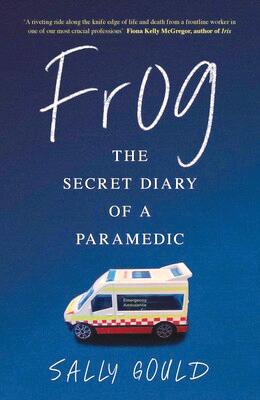
Author: Sally Gould
Publisher: Simon & Schuster
‘Frog’, a term of endearment for intensive care paramedics, derives from the notion that everything they touch croaks. Life as a paramedic, writes Sally Gould, can be traumatic, gross, dull, hilarious, magical. To make the cut, you need to be able to think outside the square, keep calm in the midst of chaos, be in possession of a strong stomach, and simply brush it off when patients die. That’s on top of having a profound understanding of the human body, plus the skills to counter its failings.
To go in the draw, email entries to giveaways@ieu.asn.au with the title of the book you would like to receive in the subject line. Write your name, membership number and postal address in the body of your email. All entries must be received by 3 August 2025.